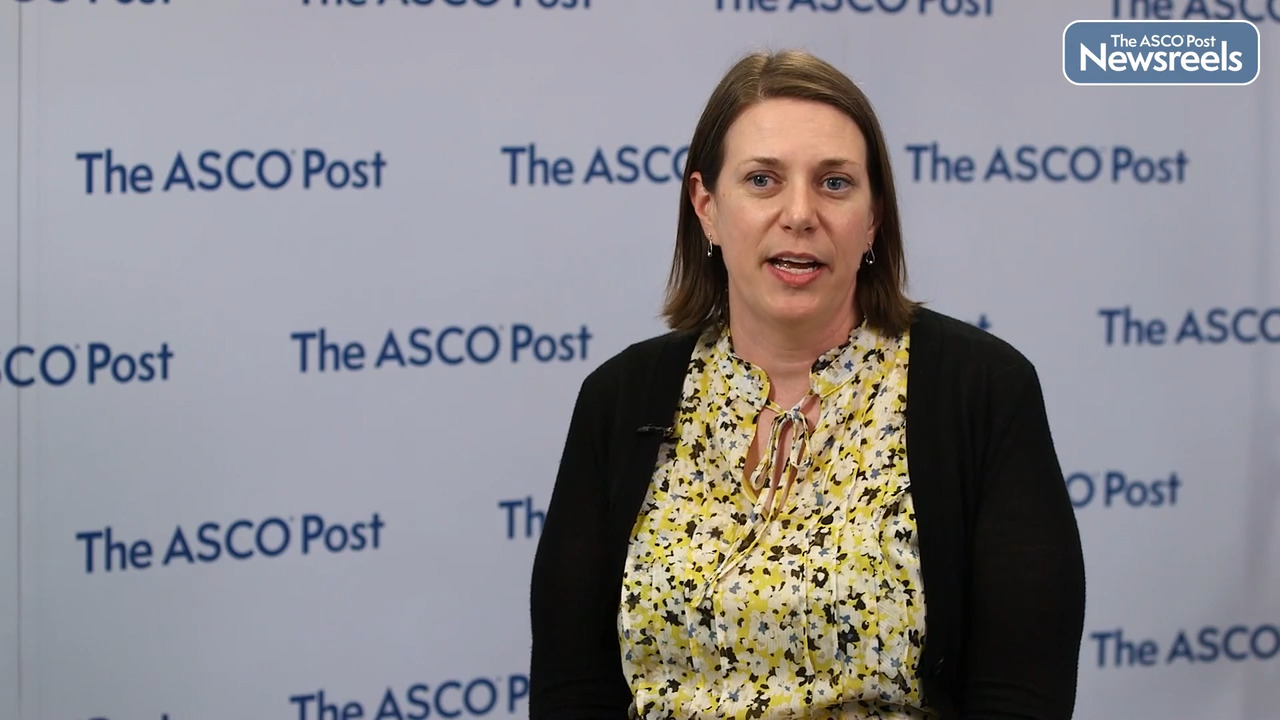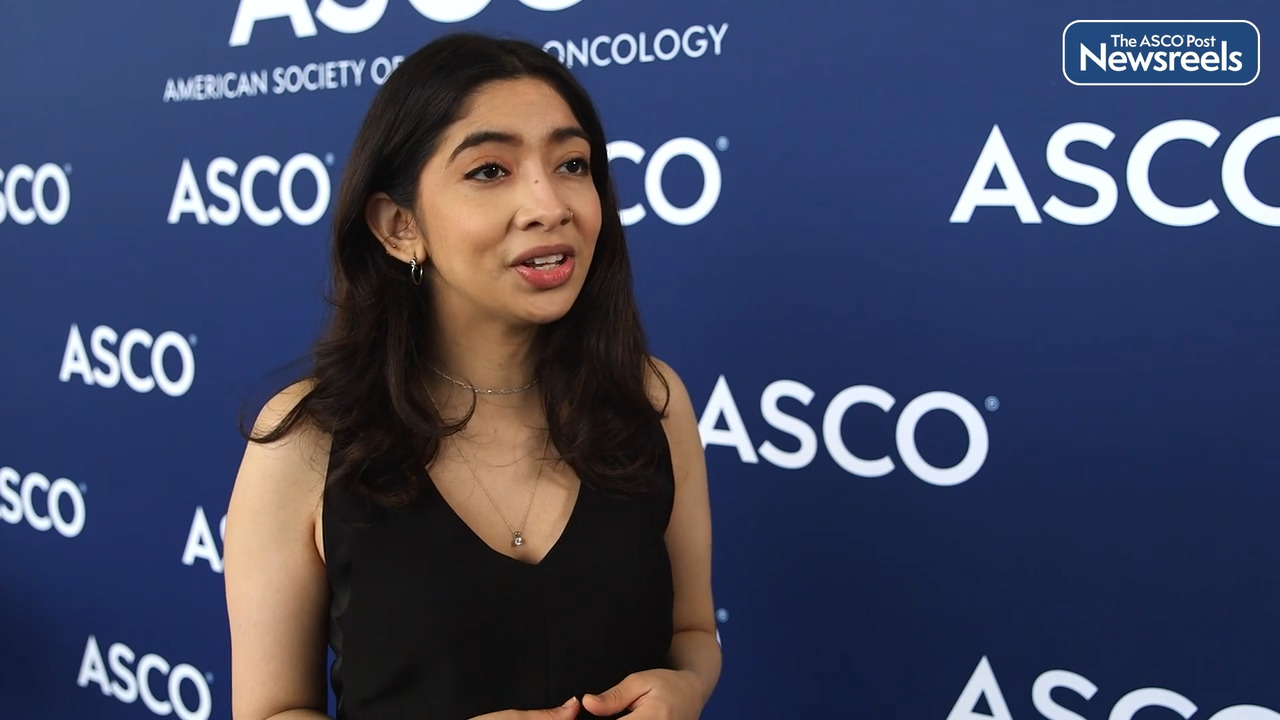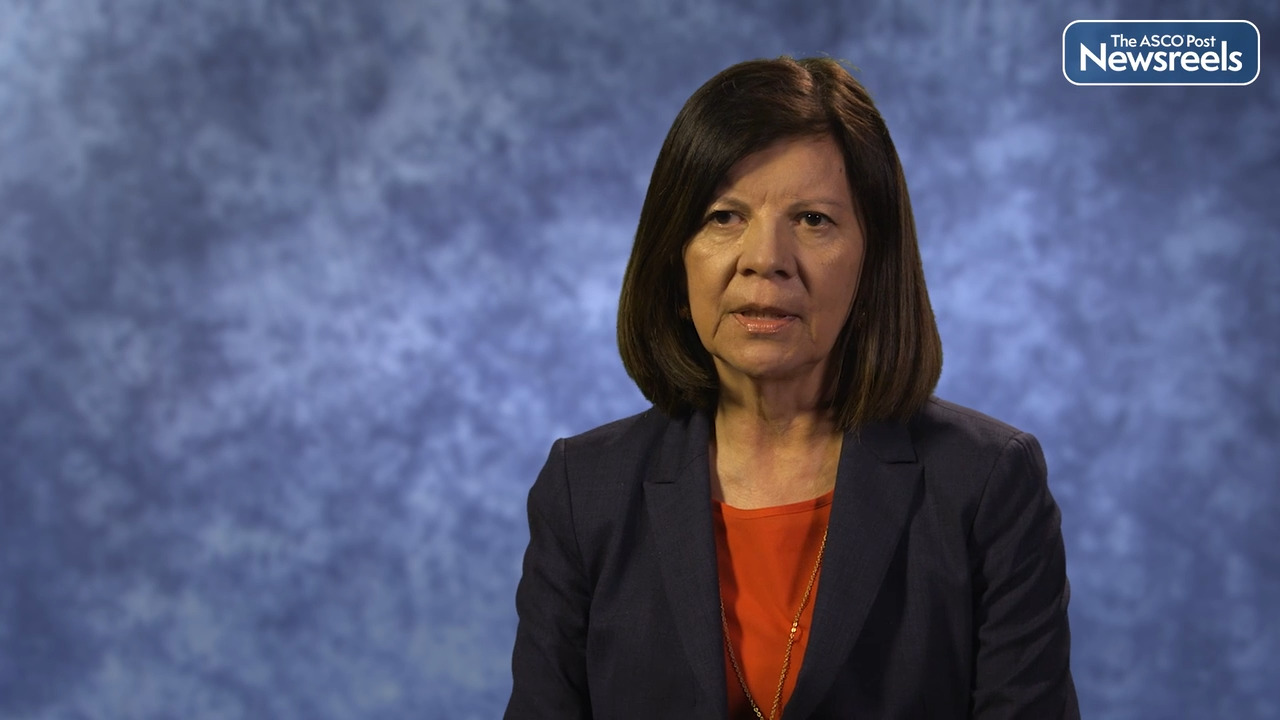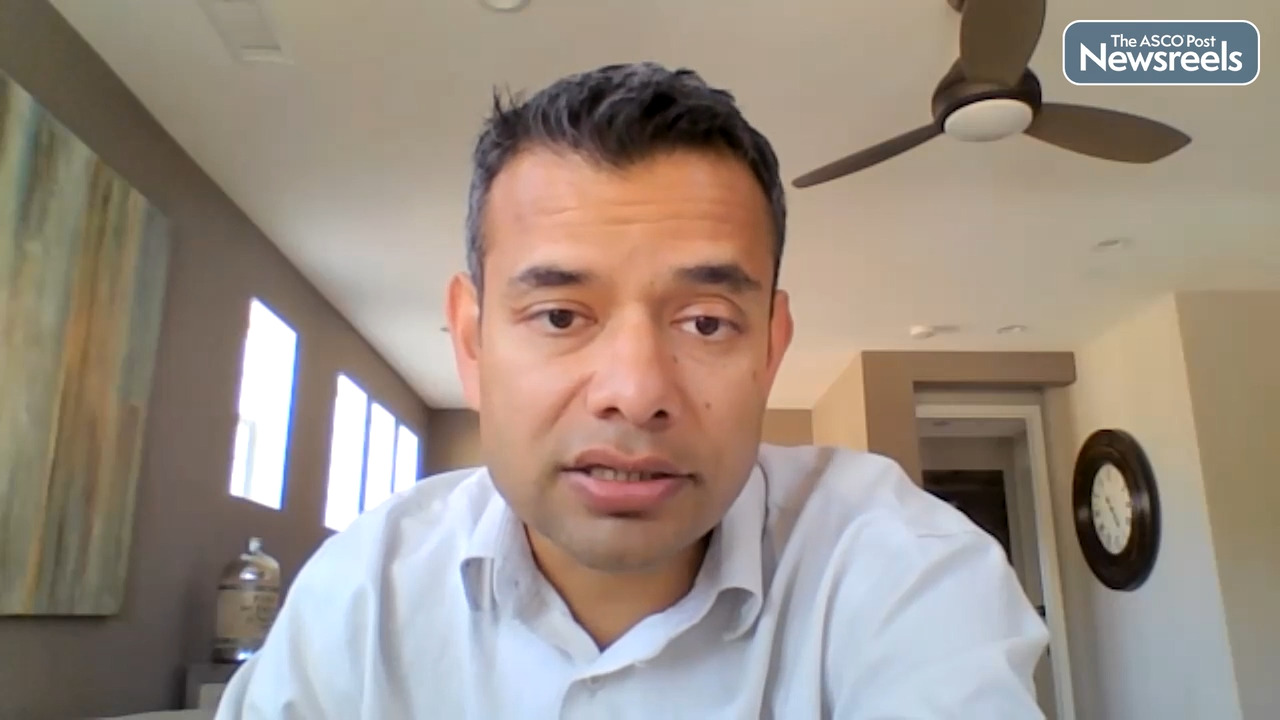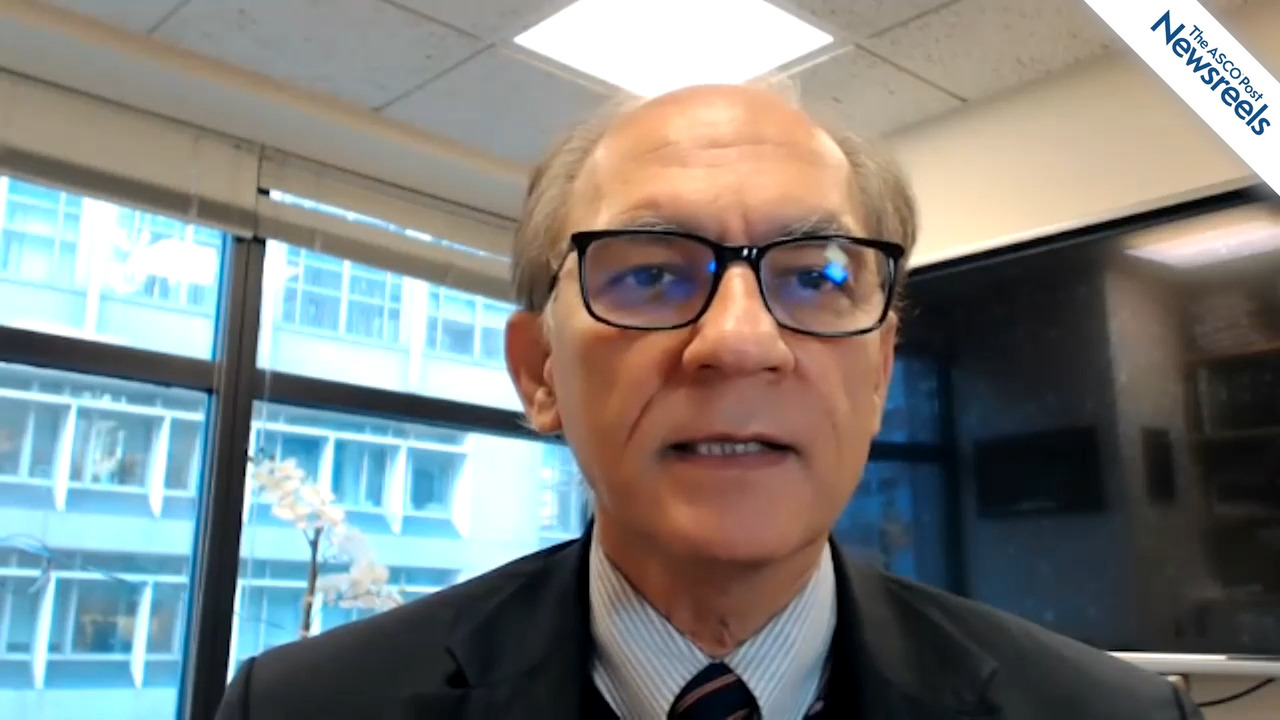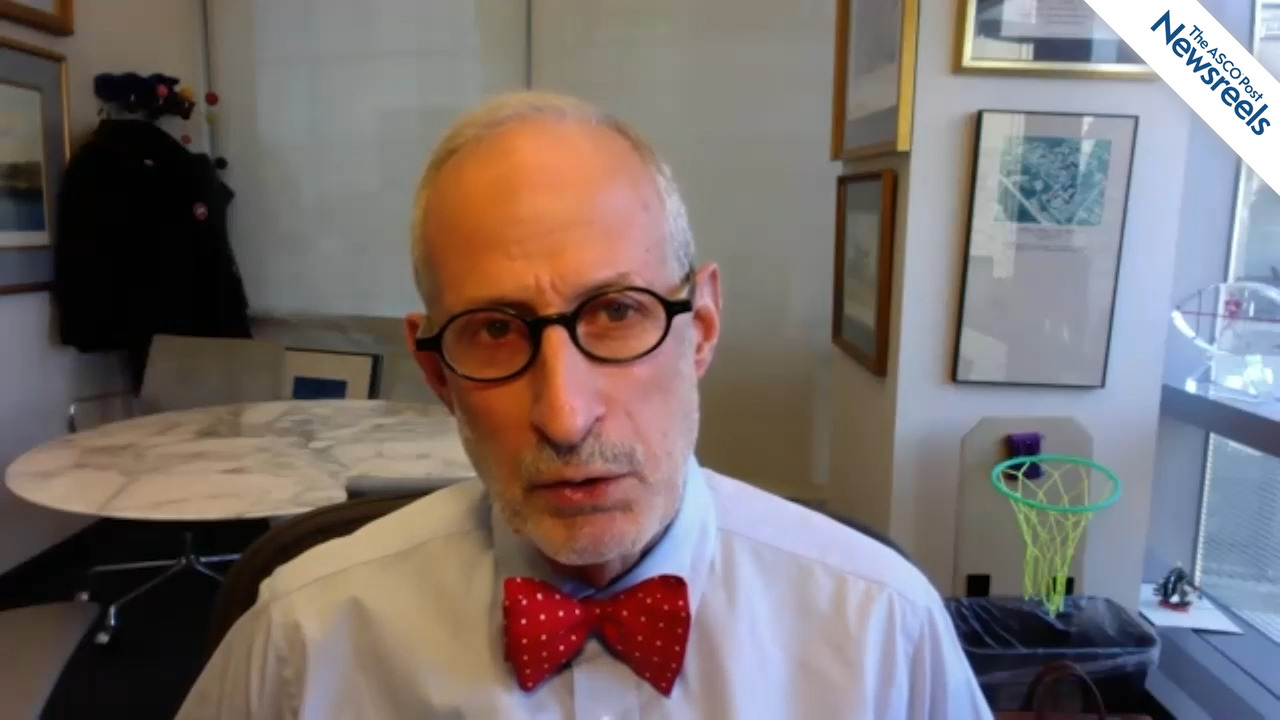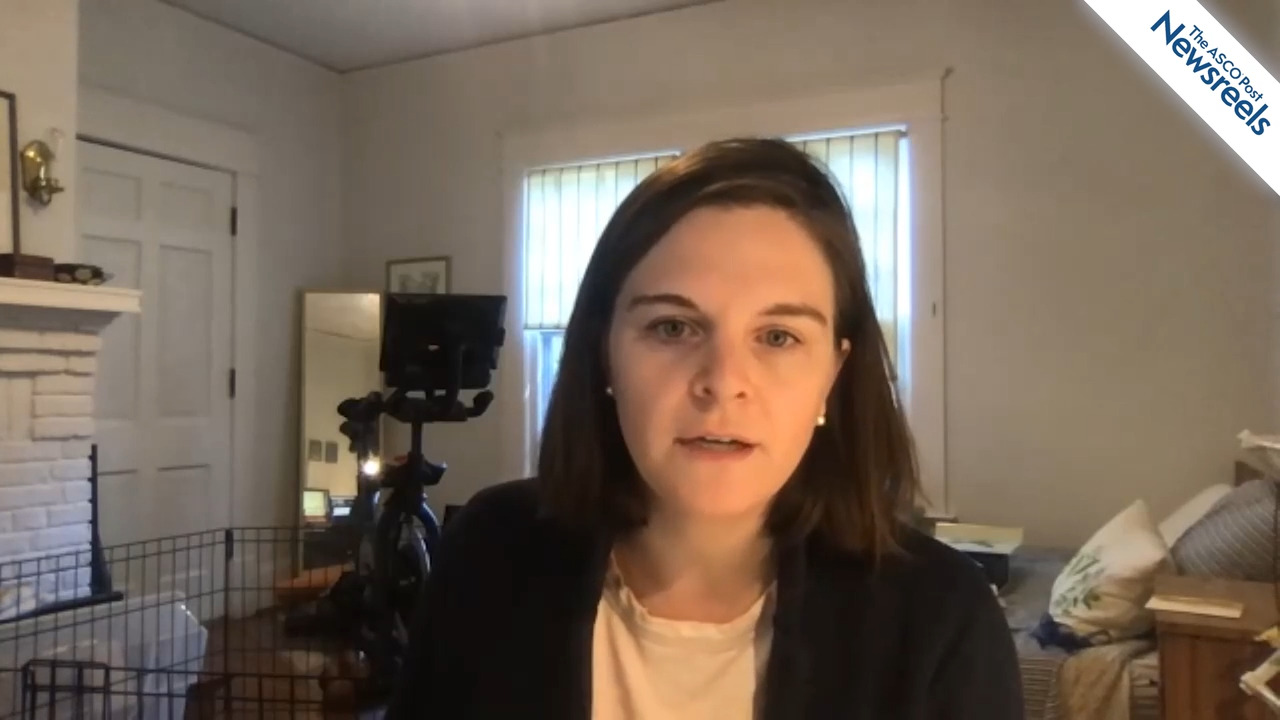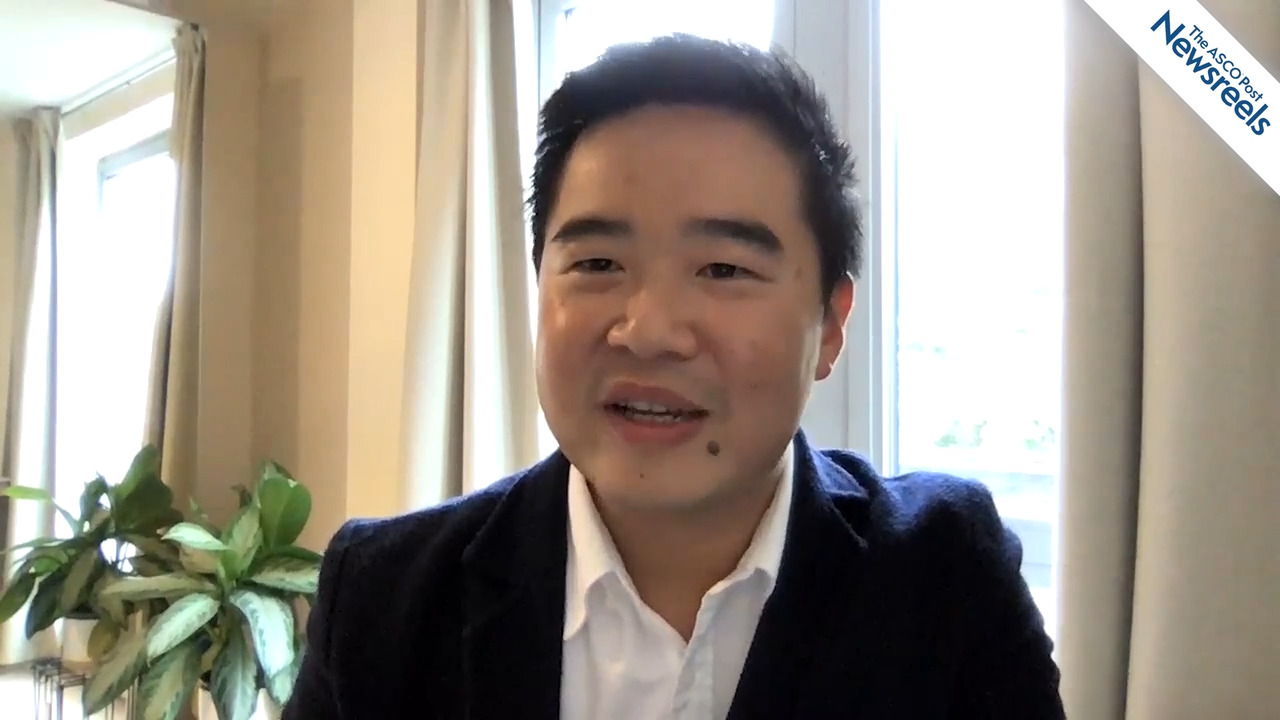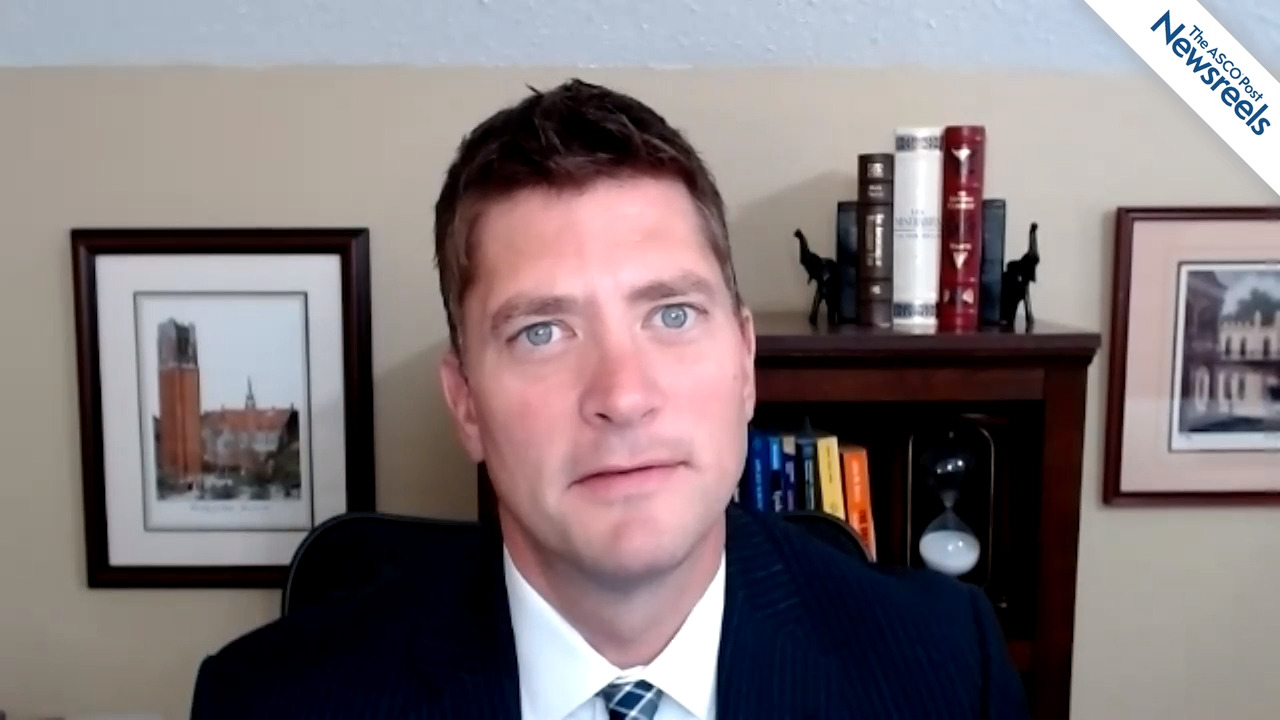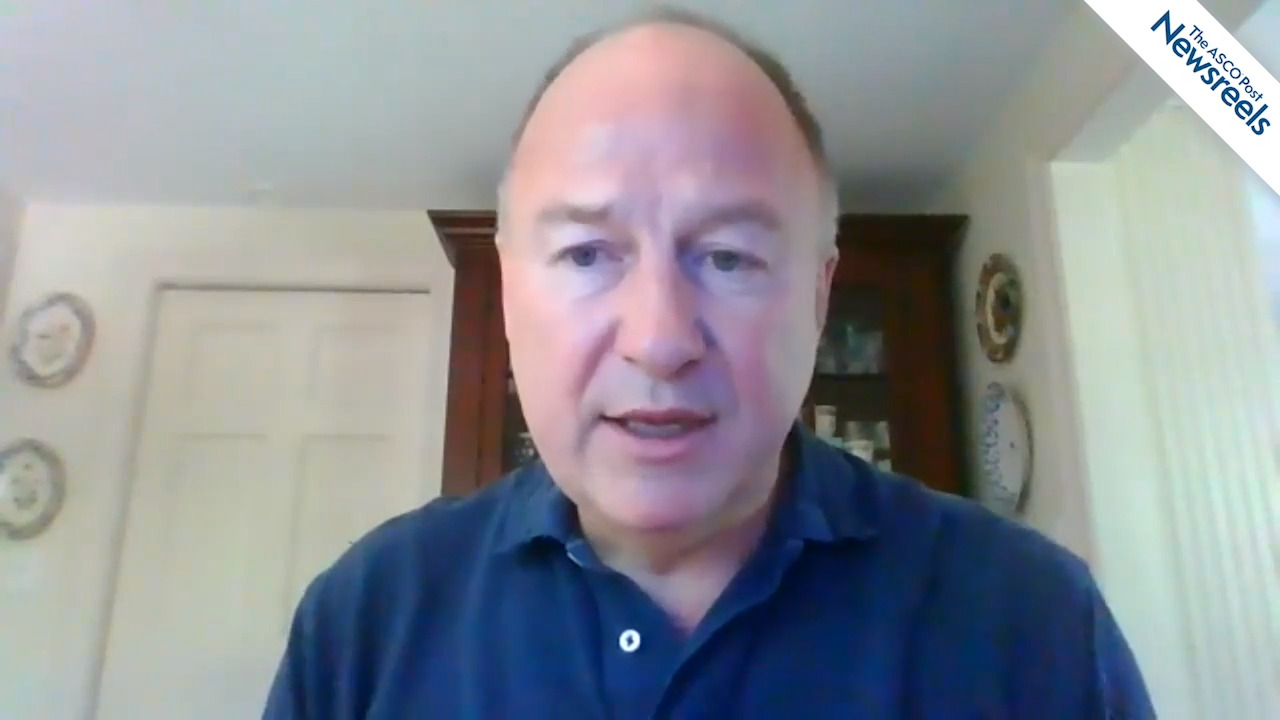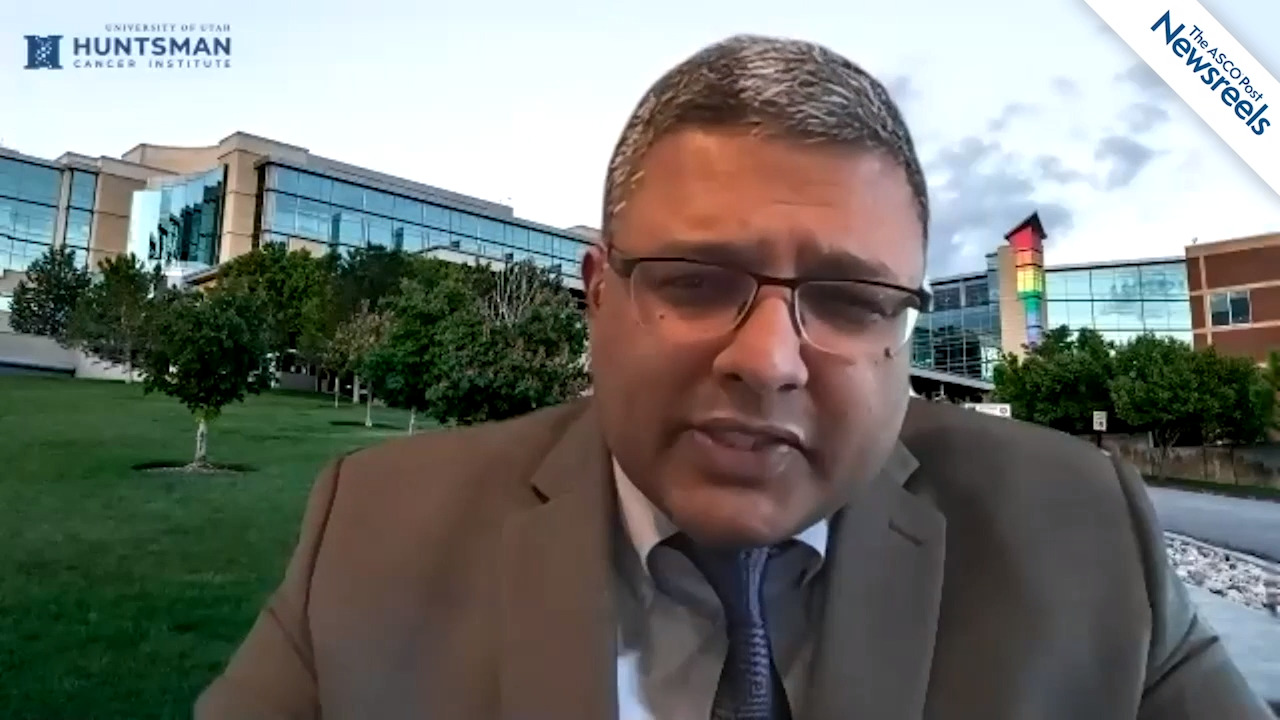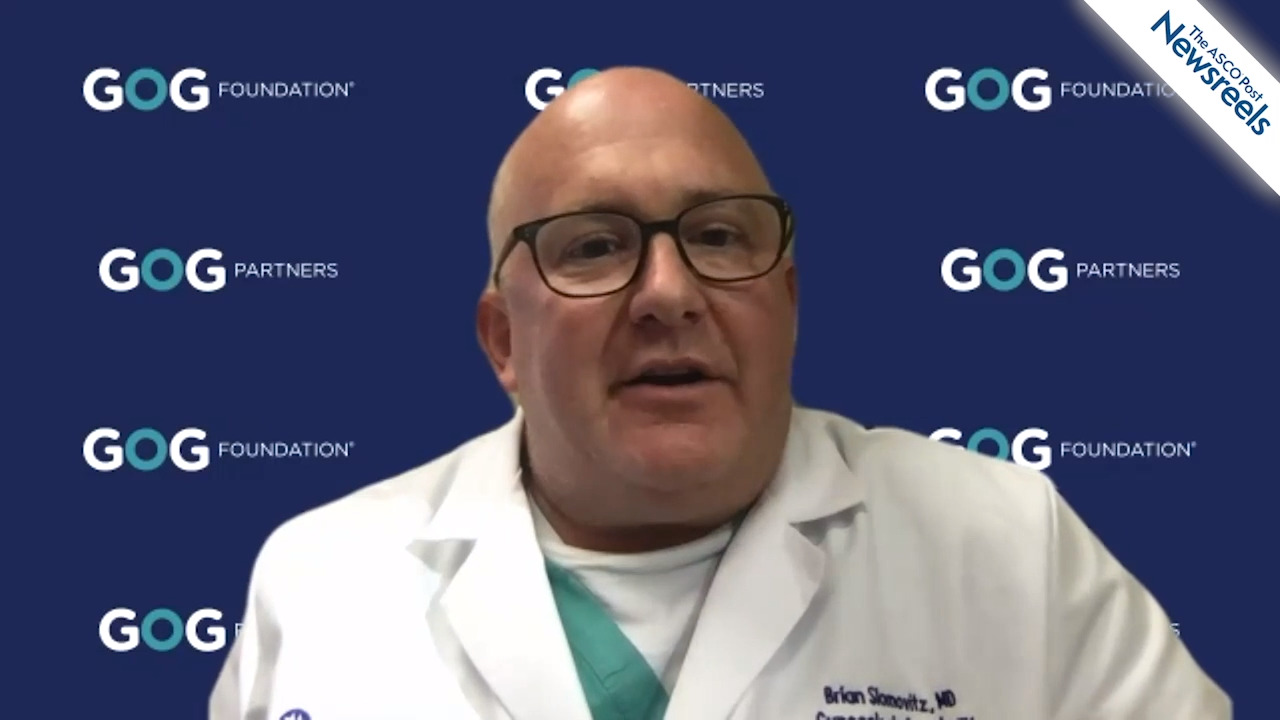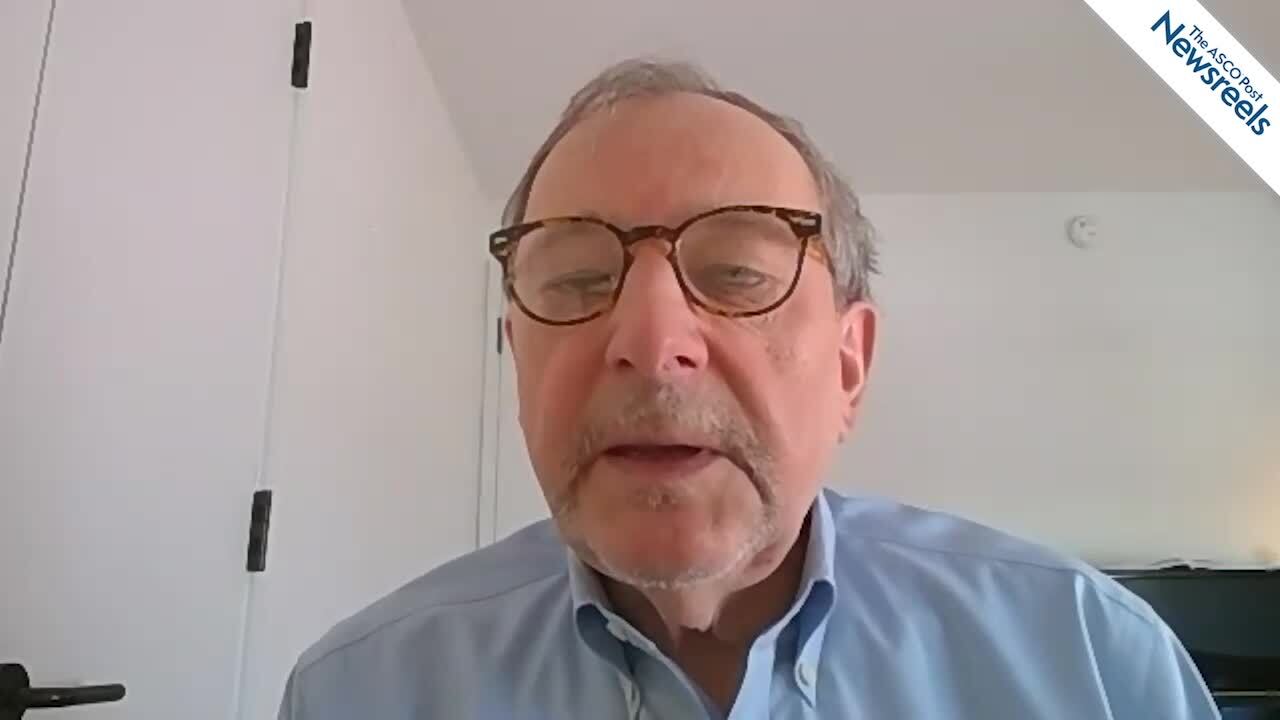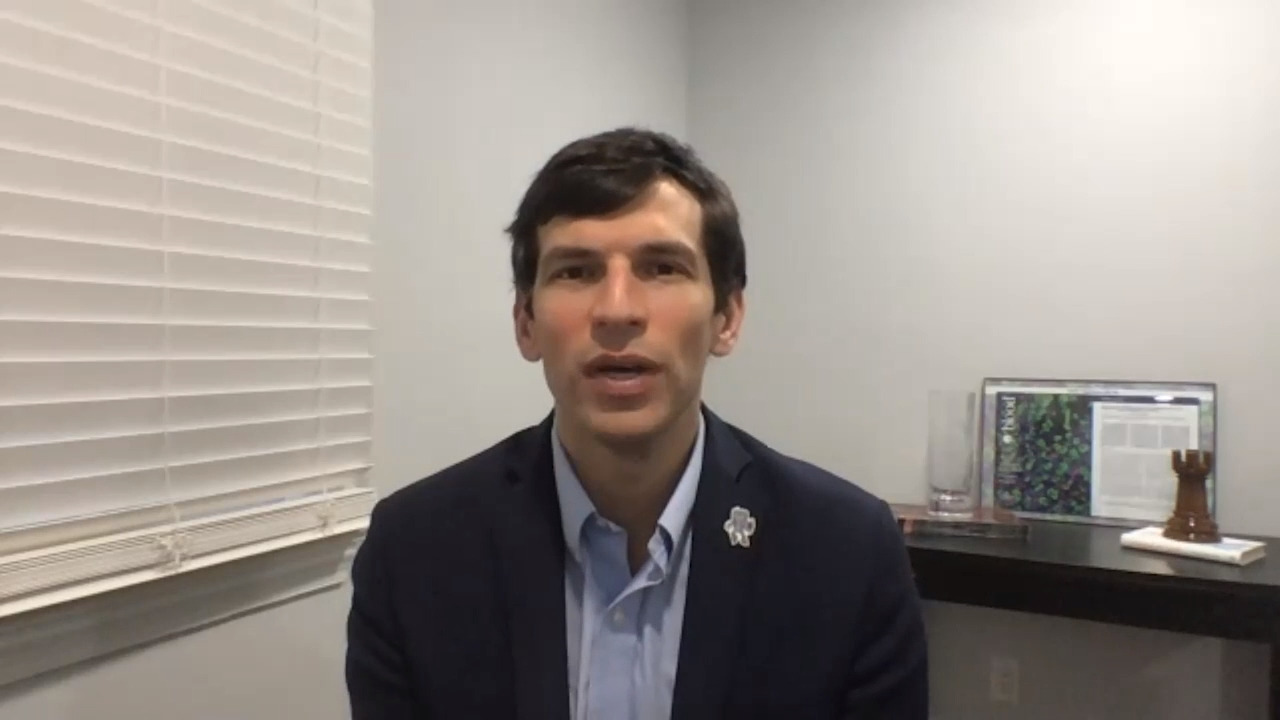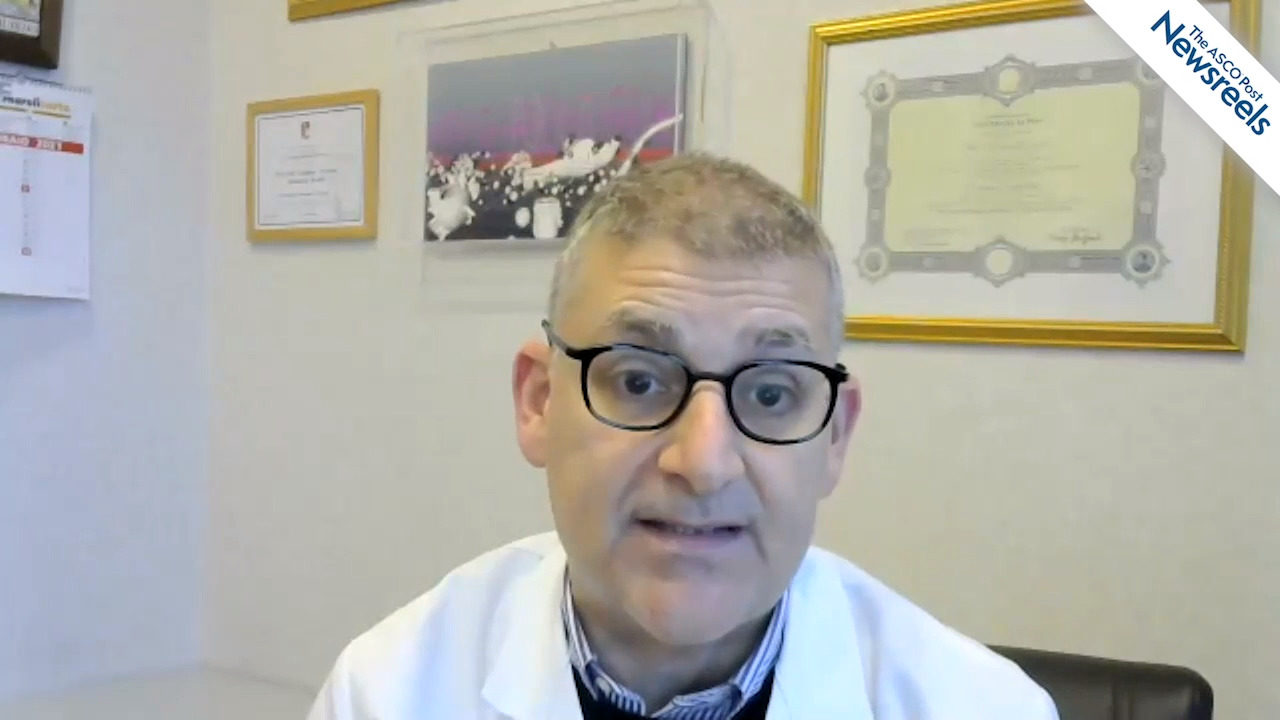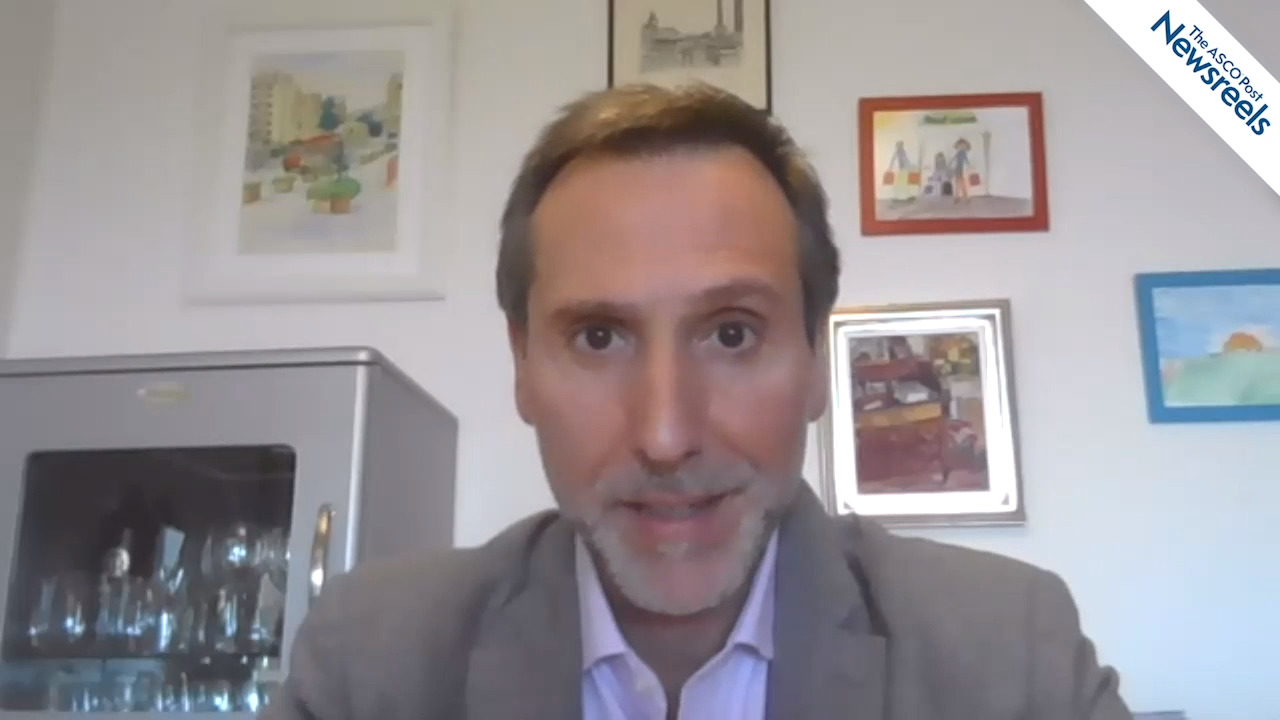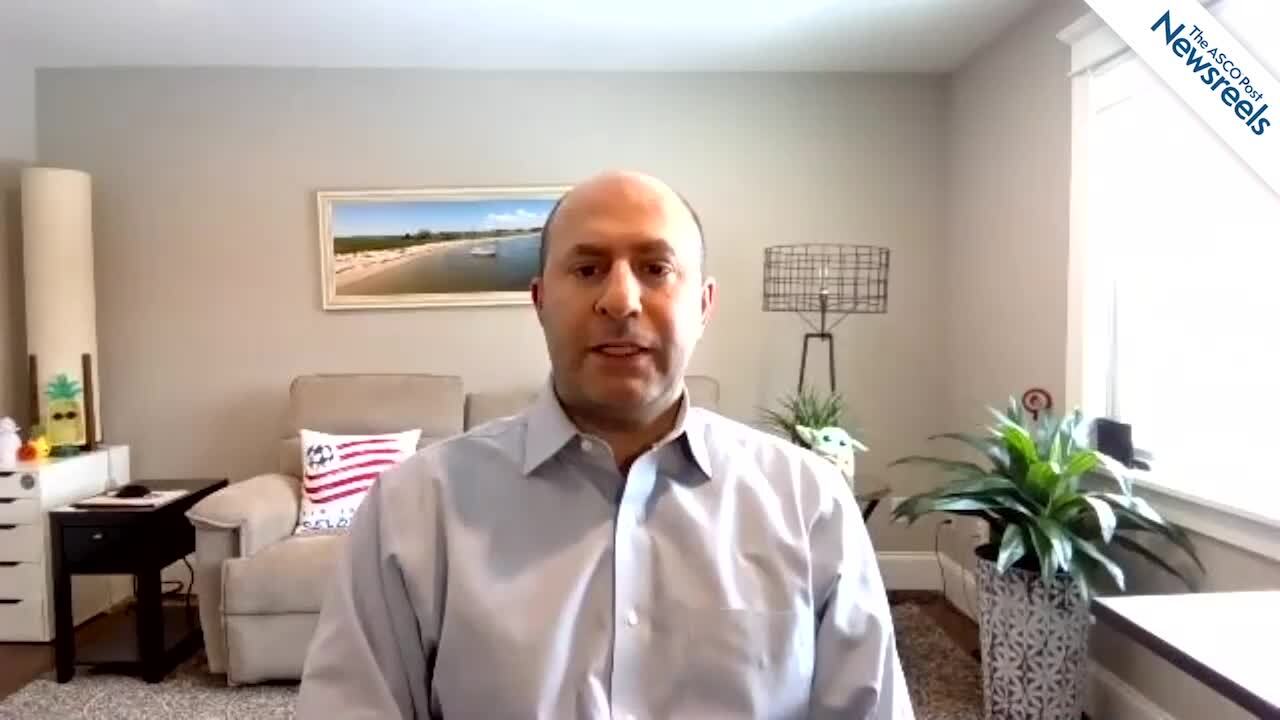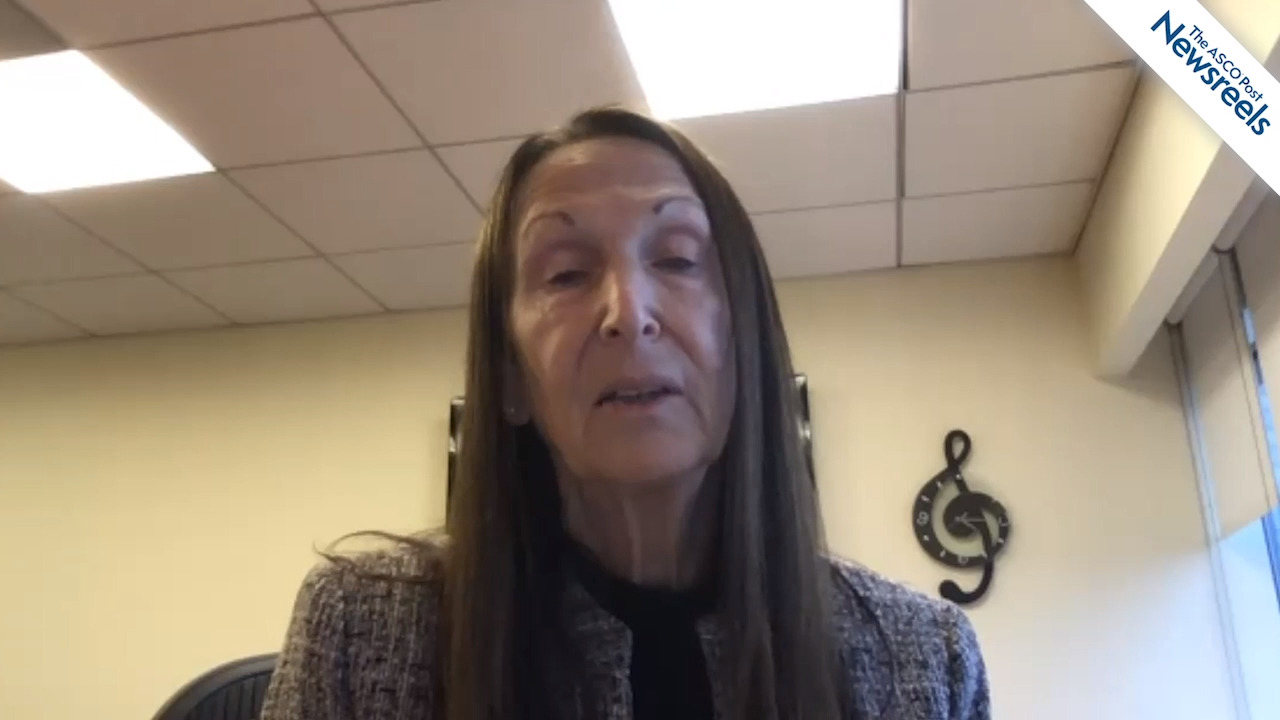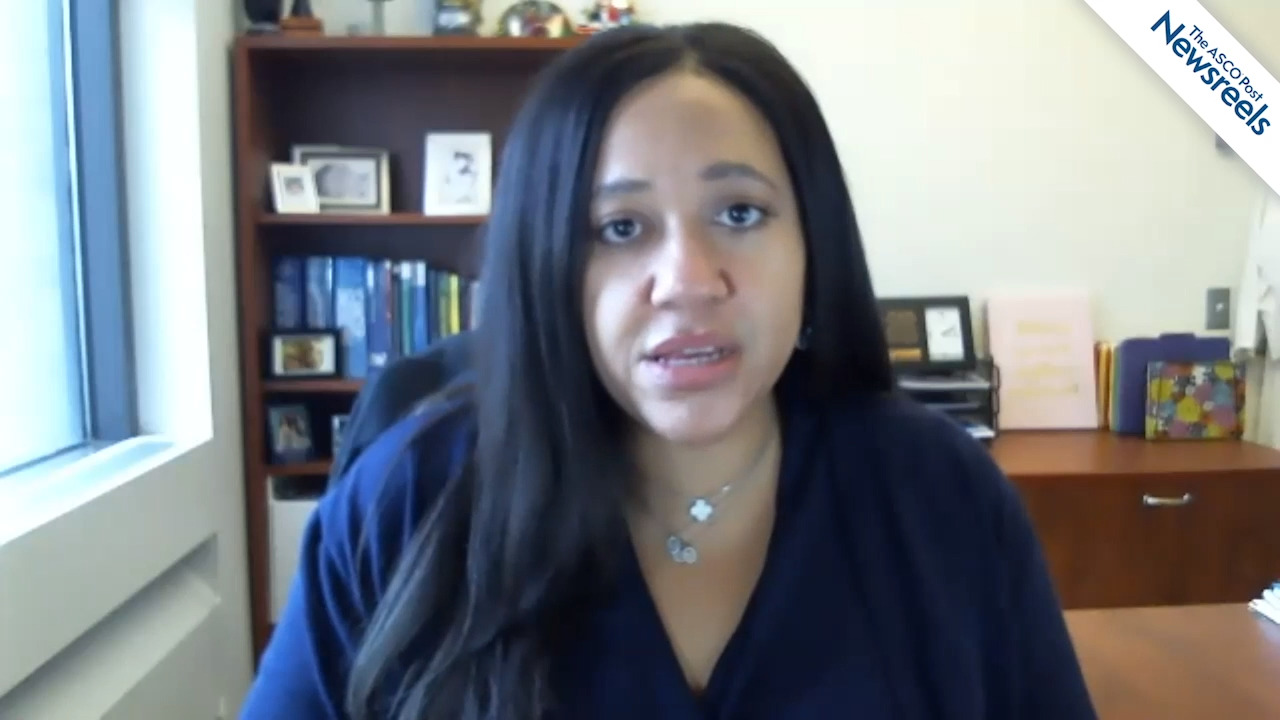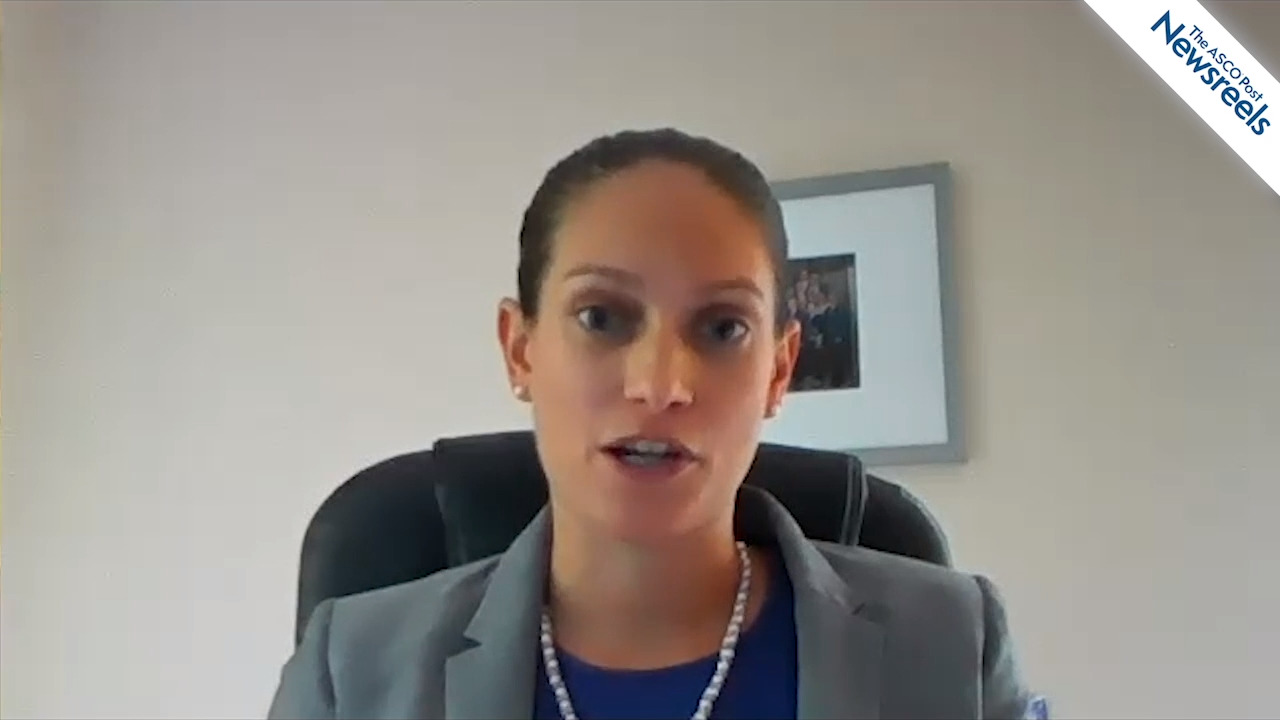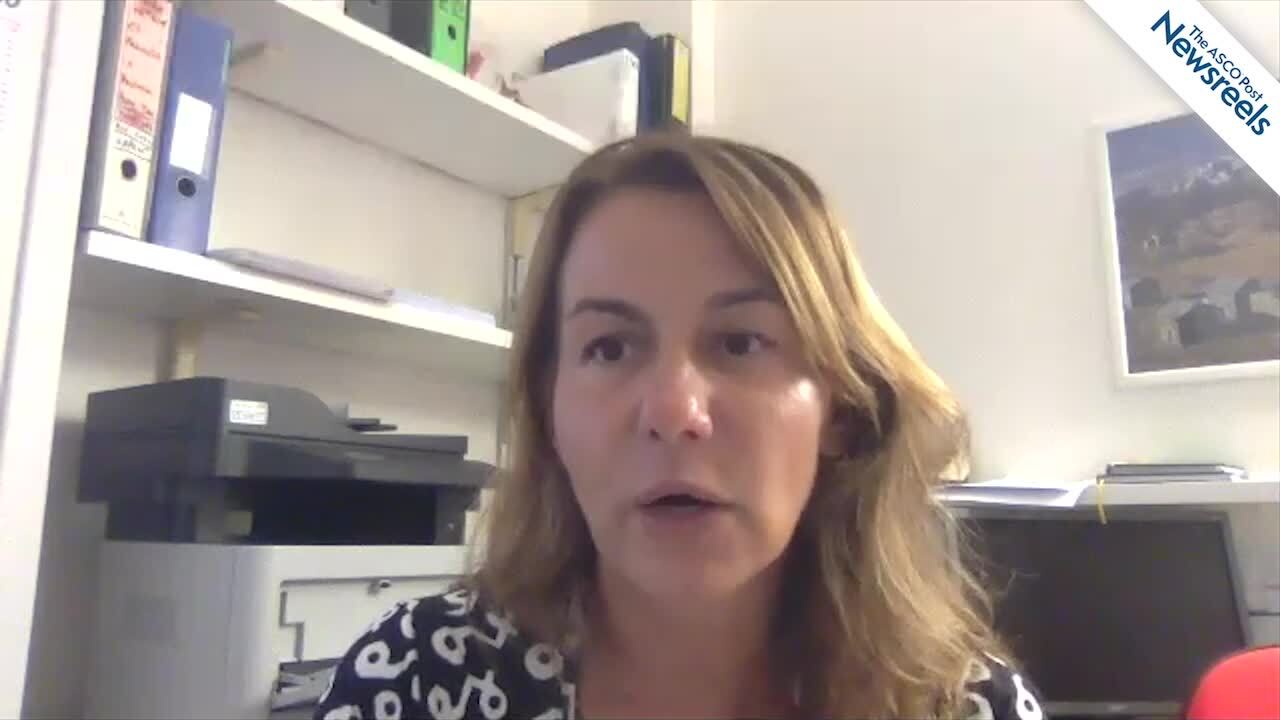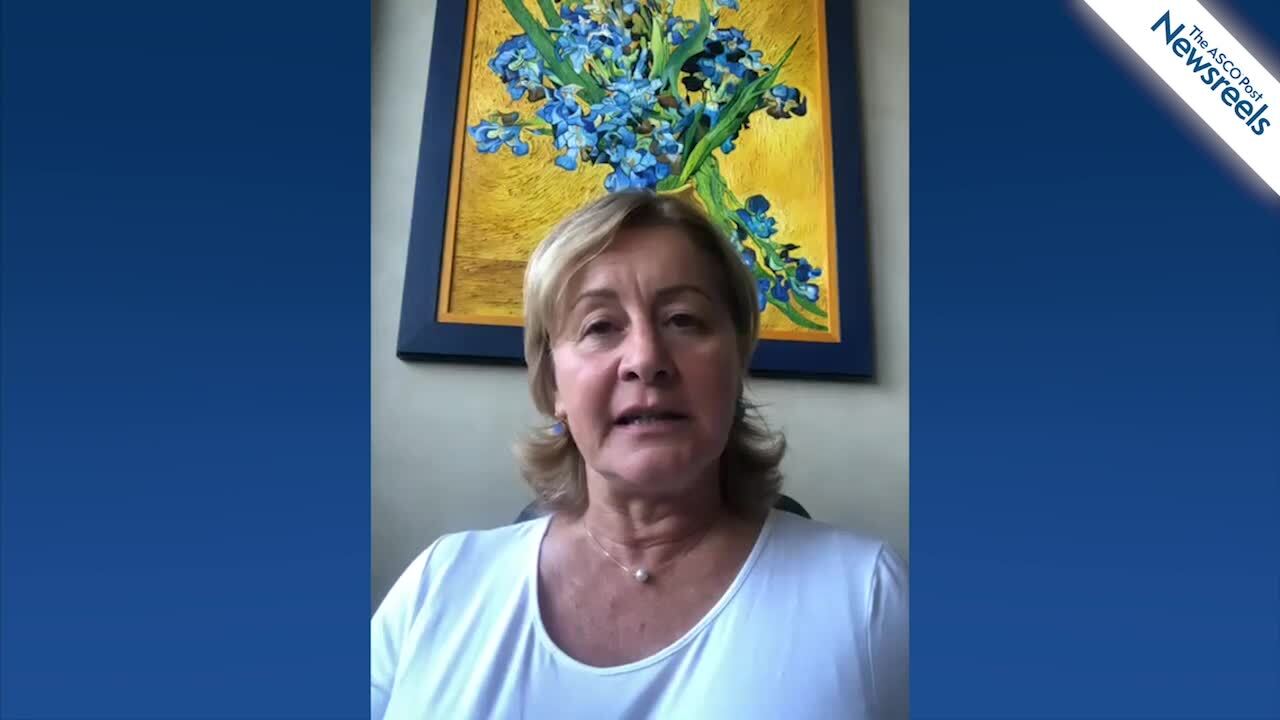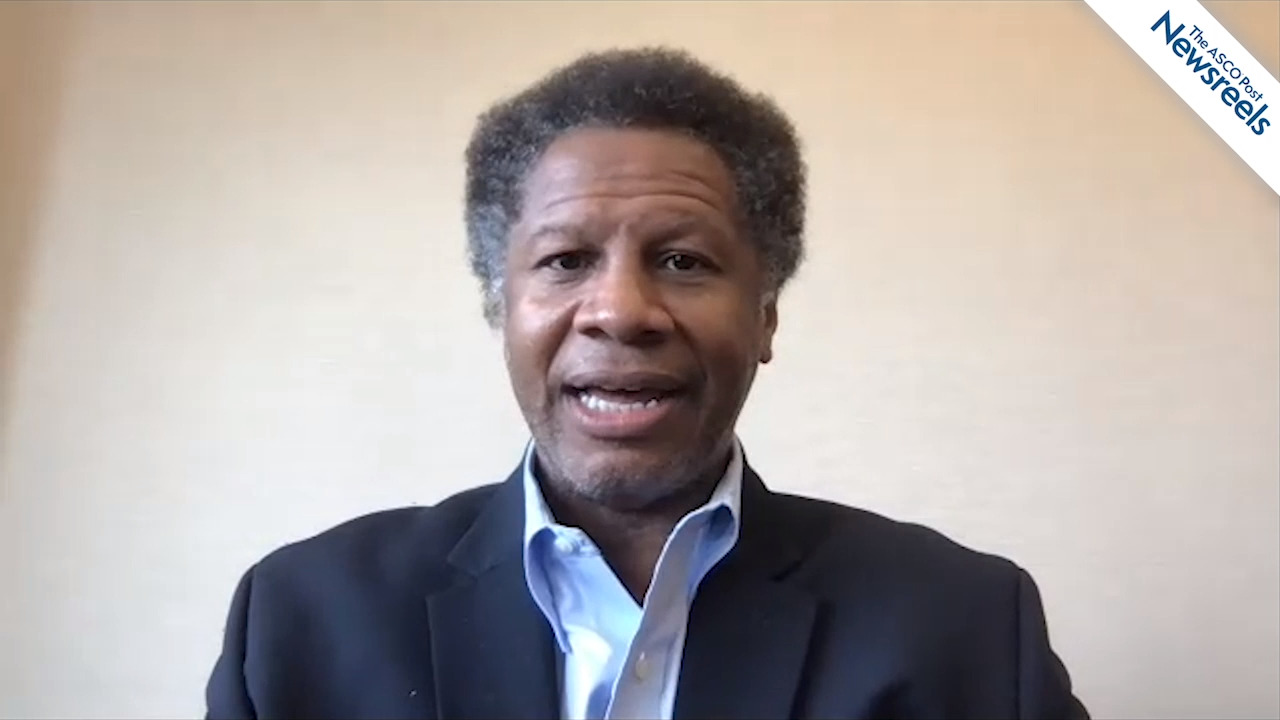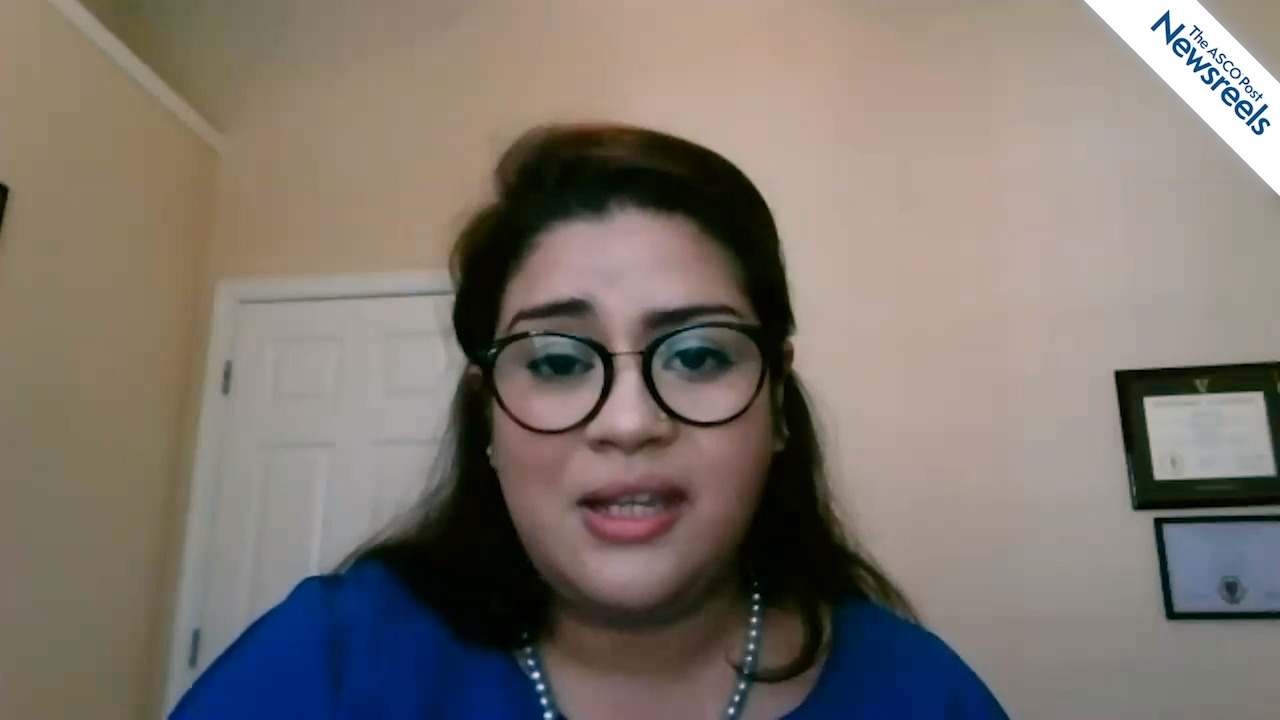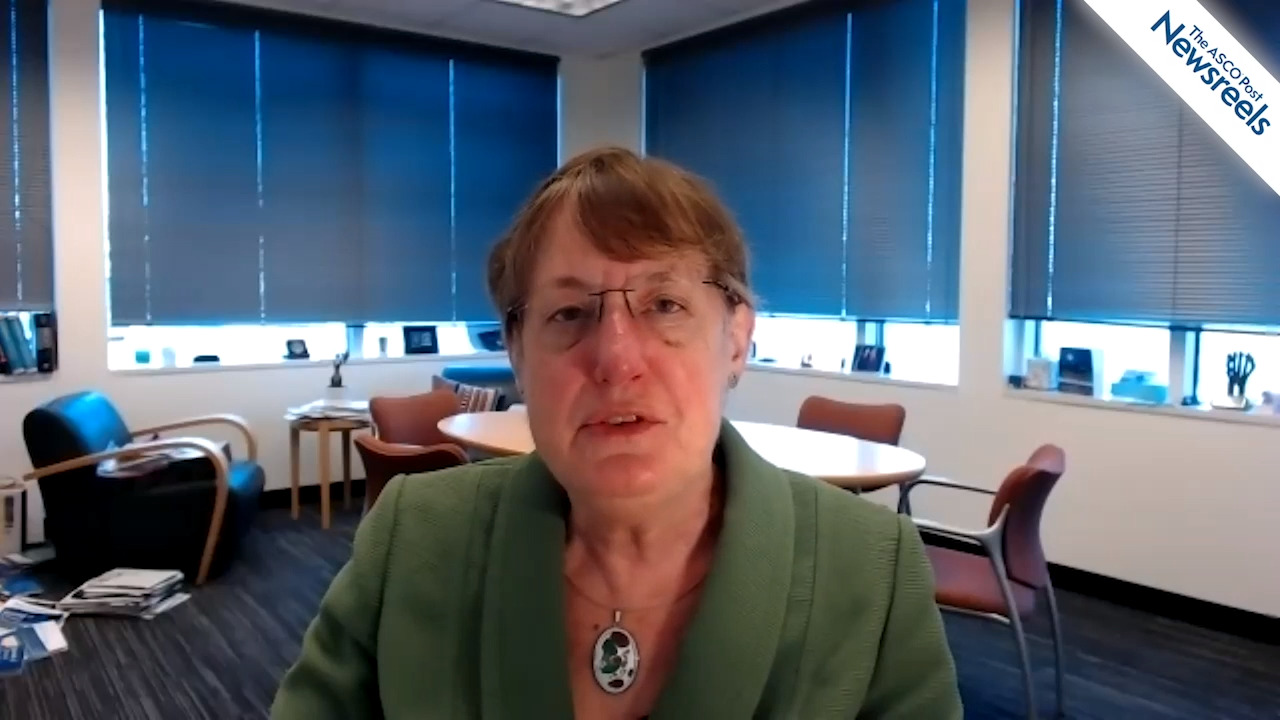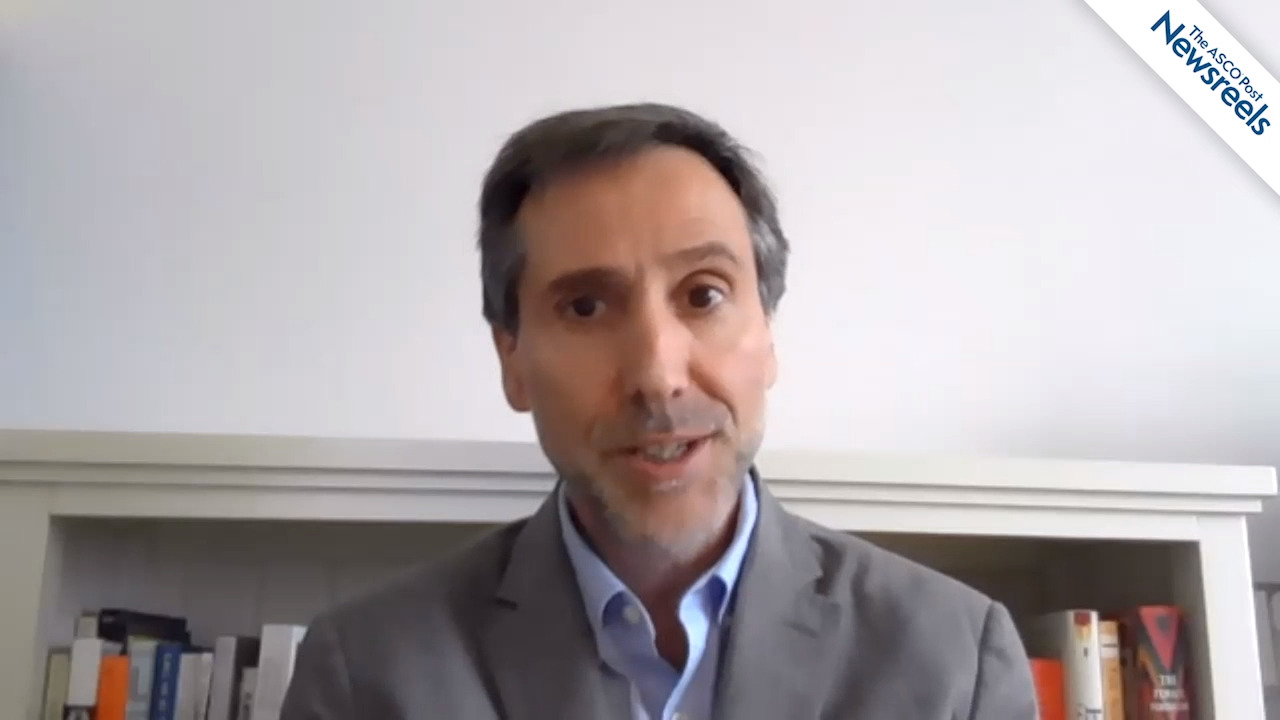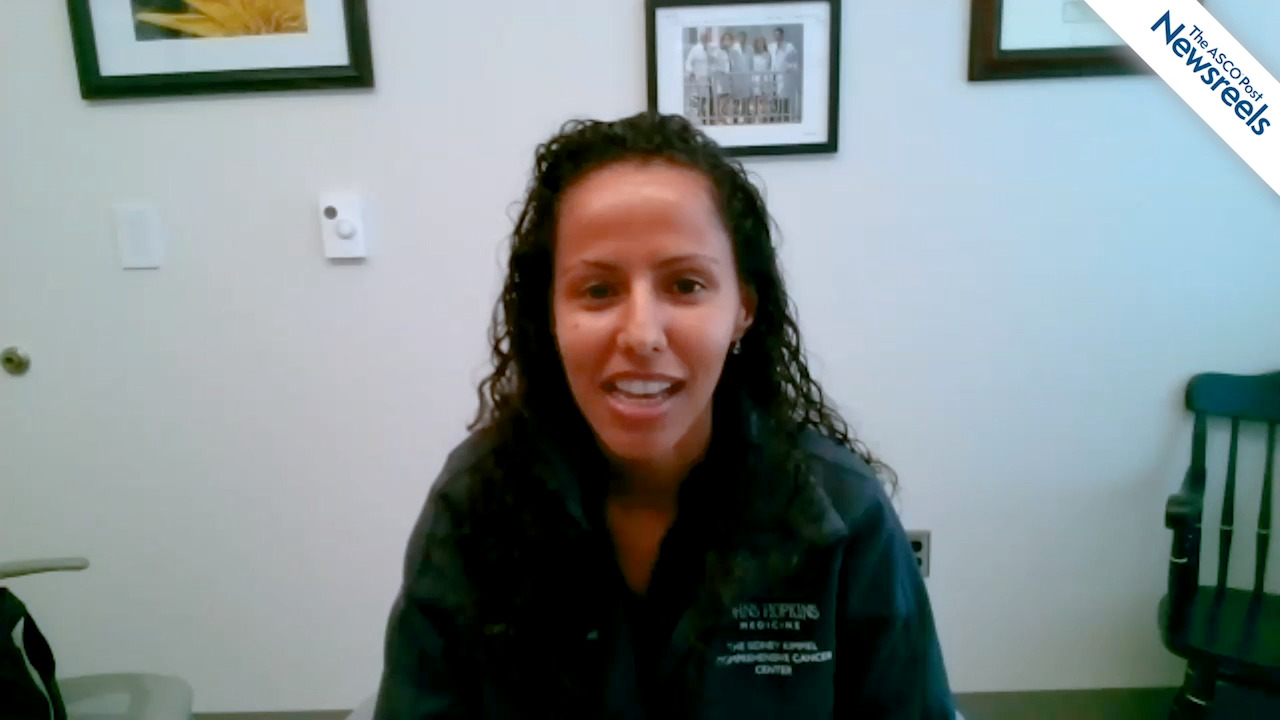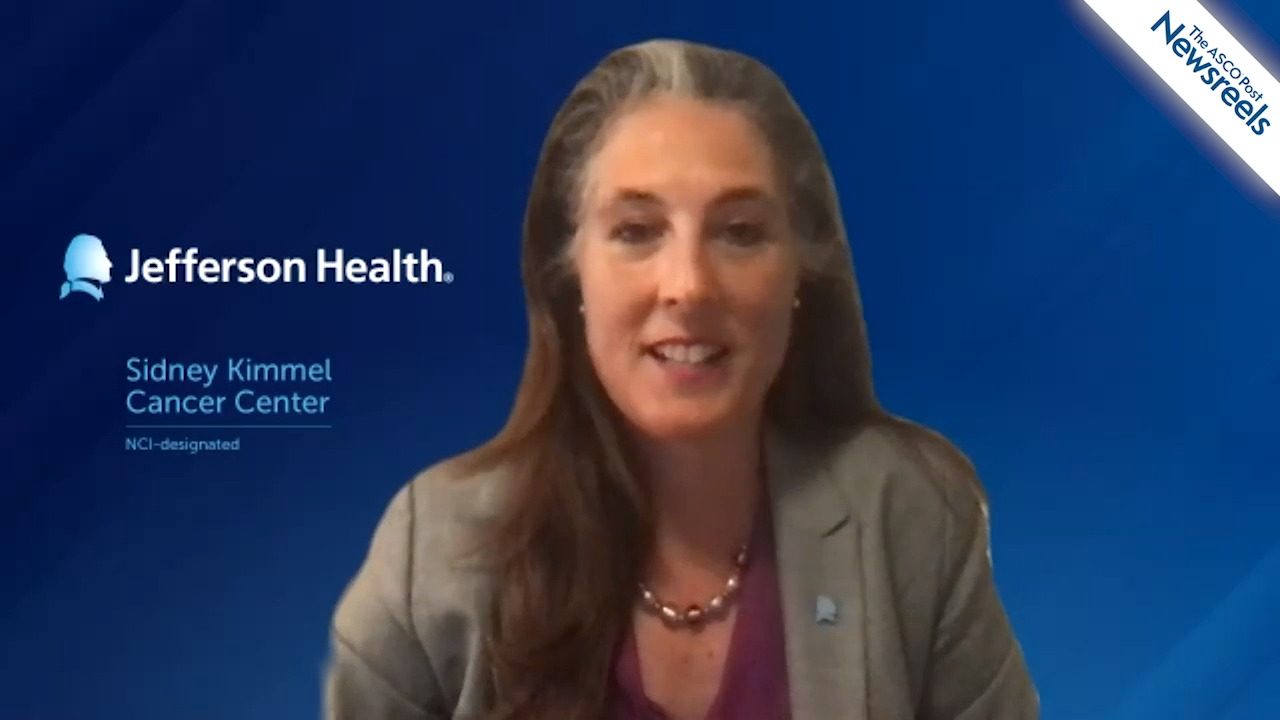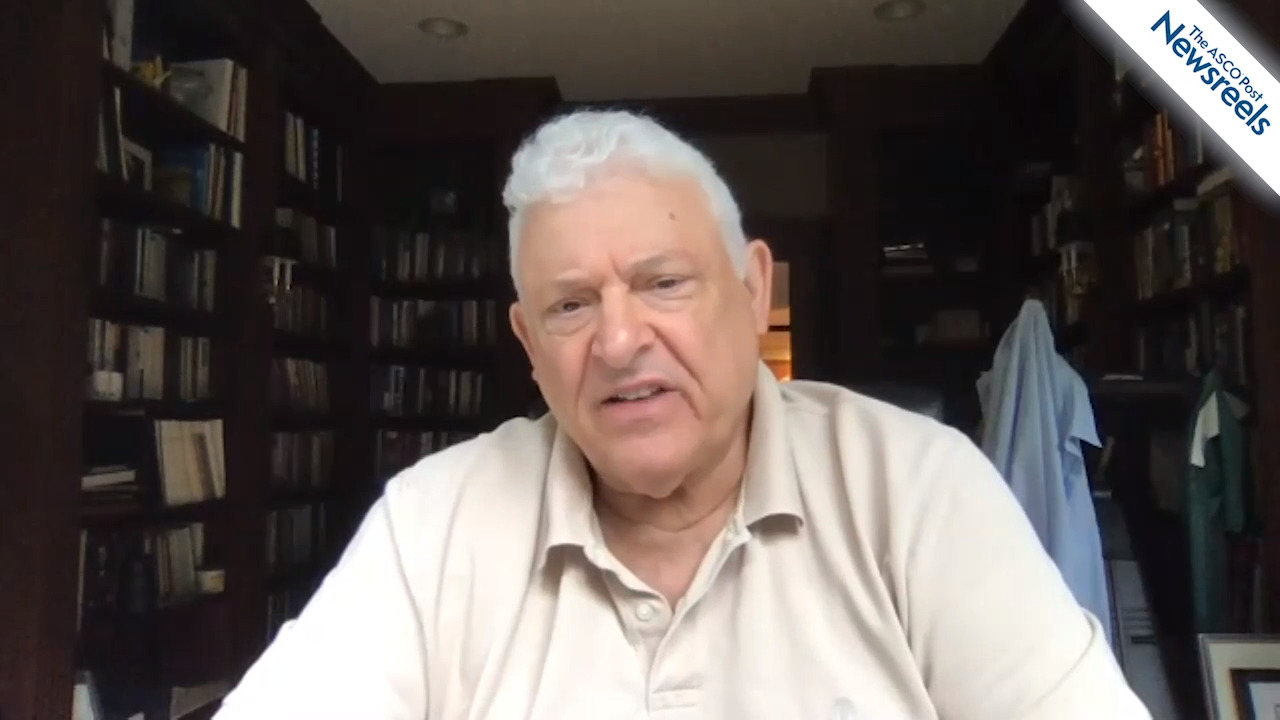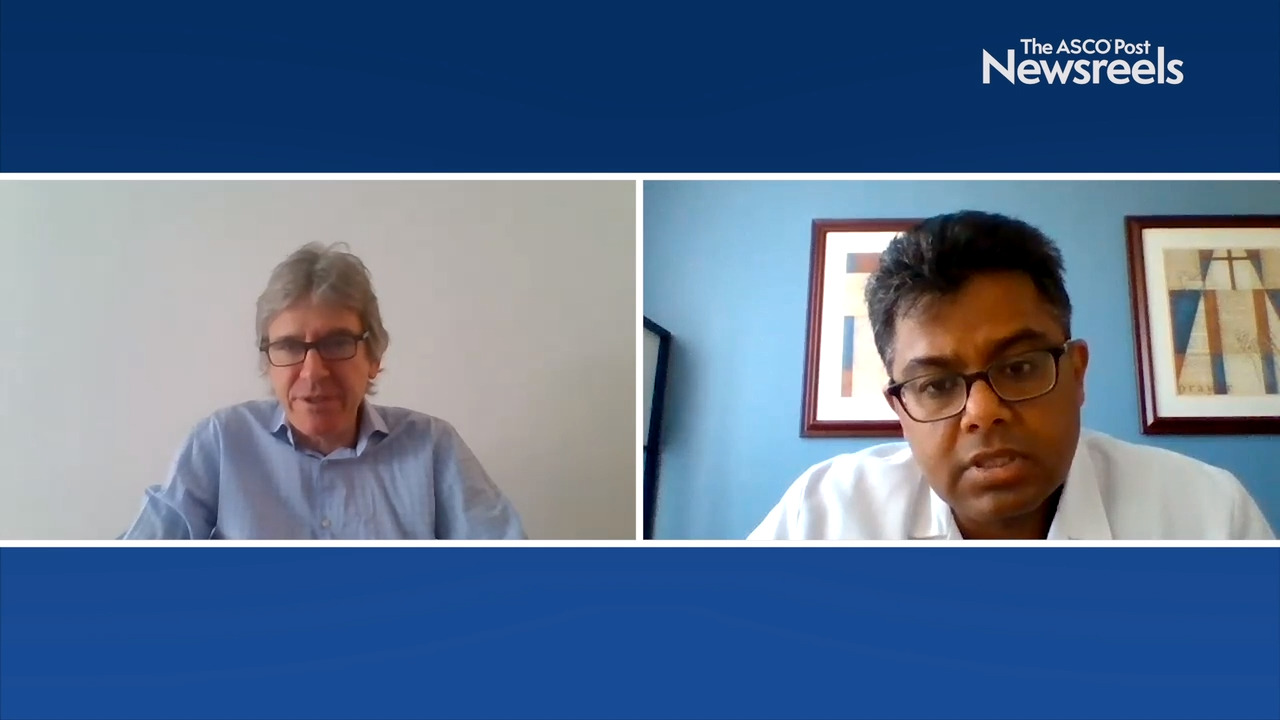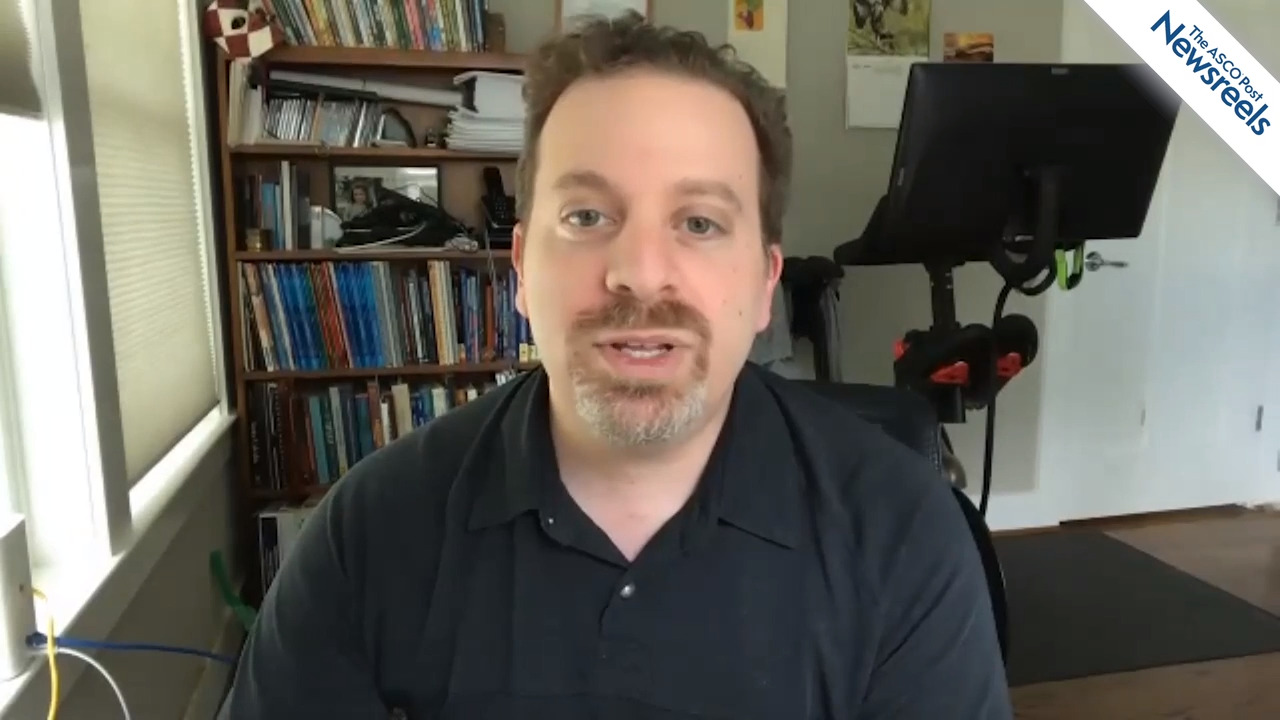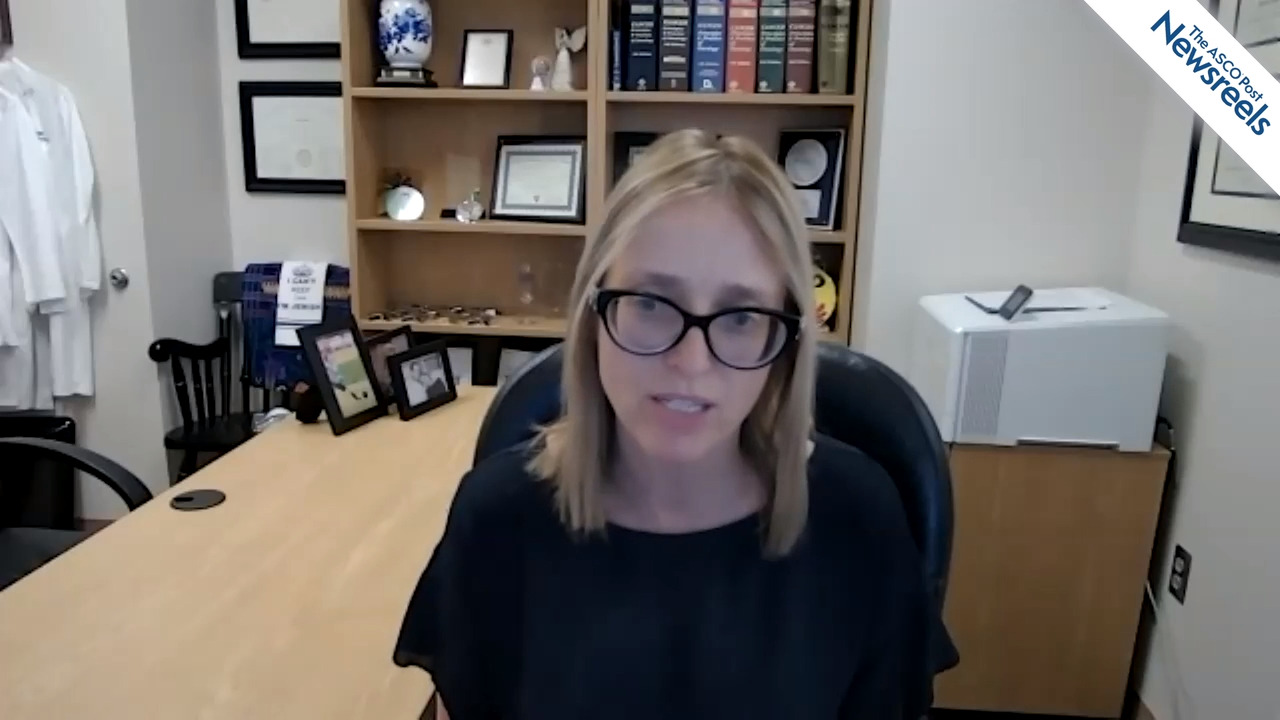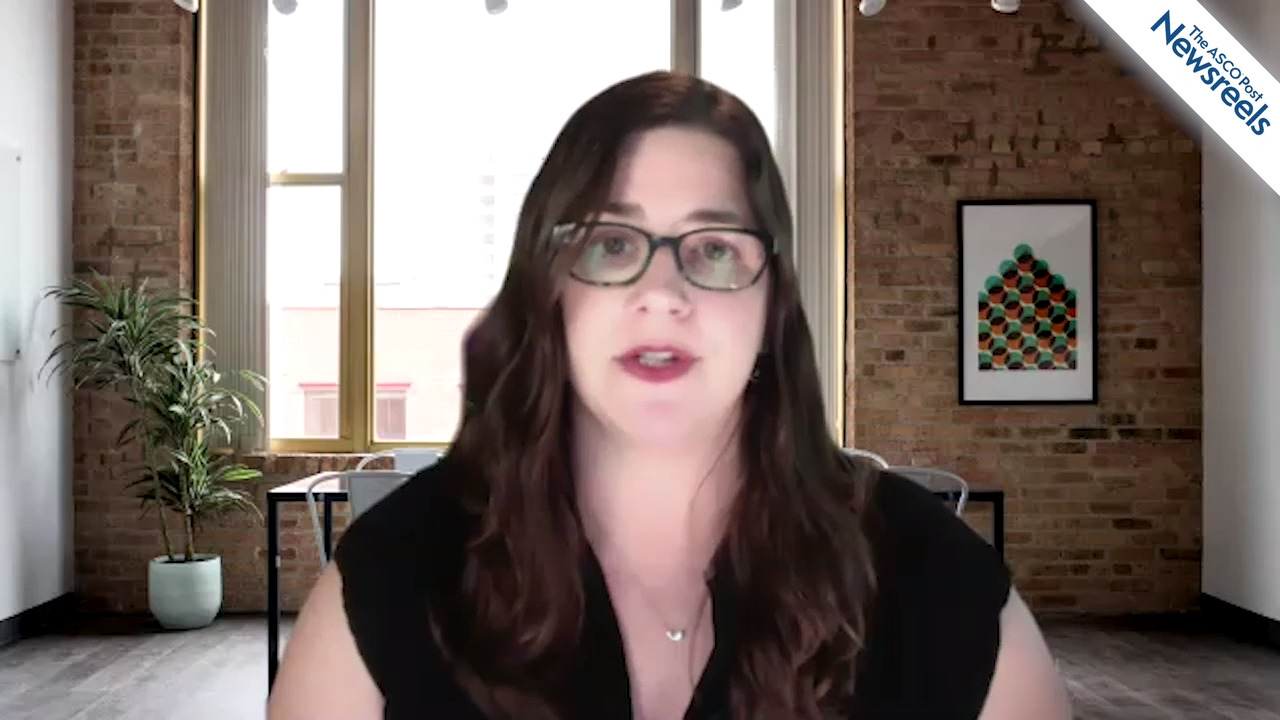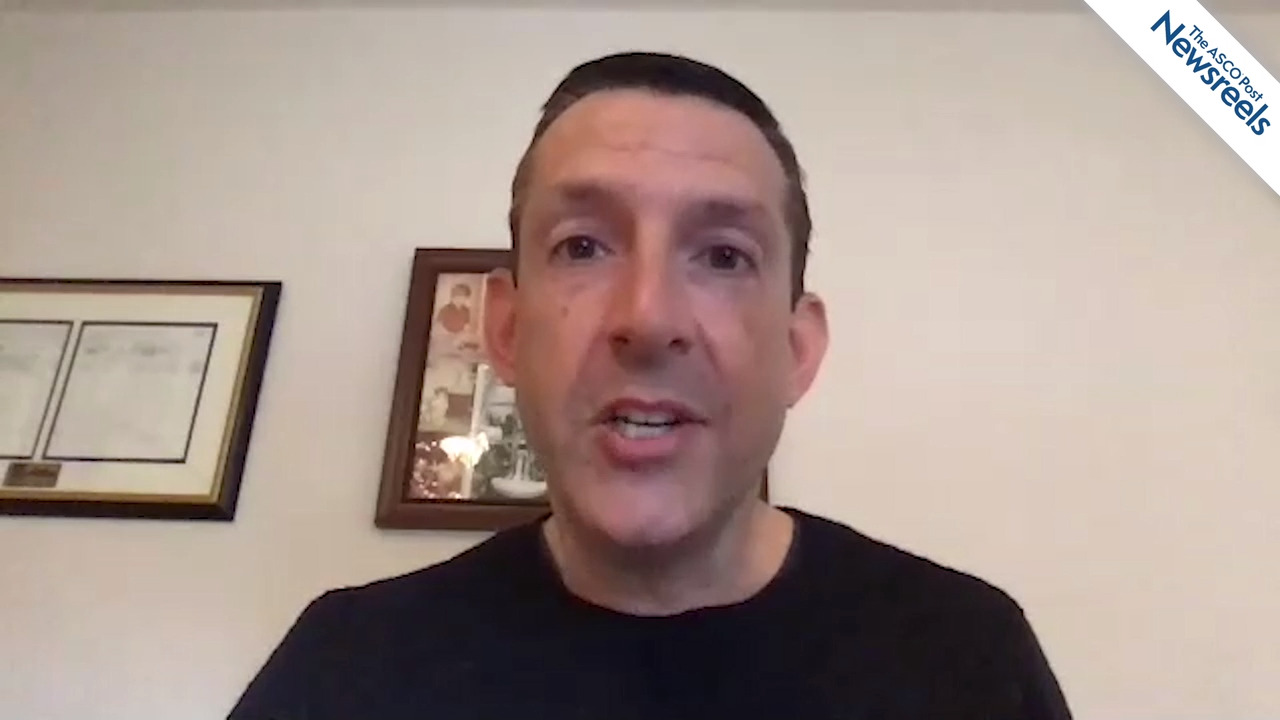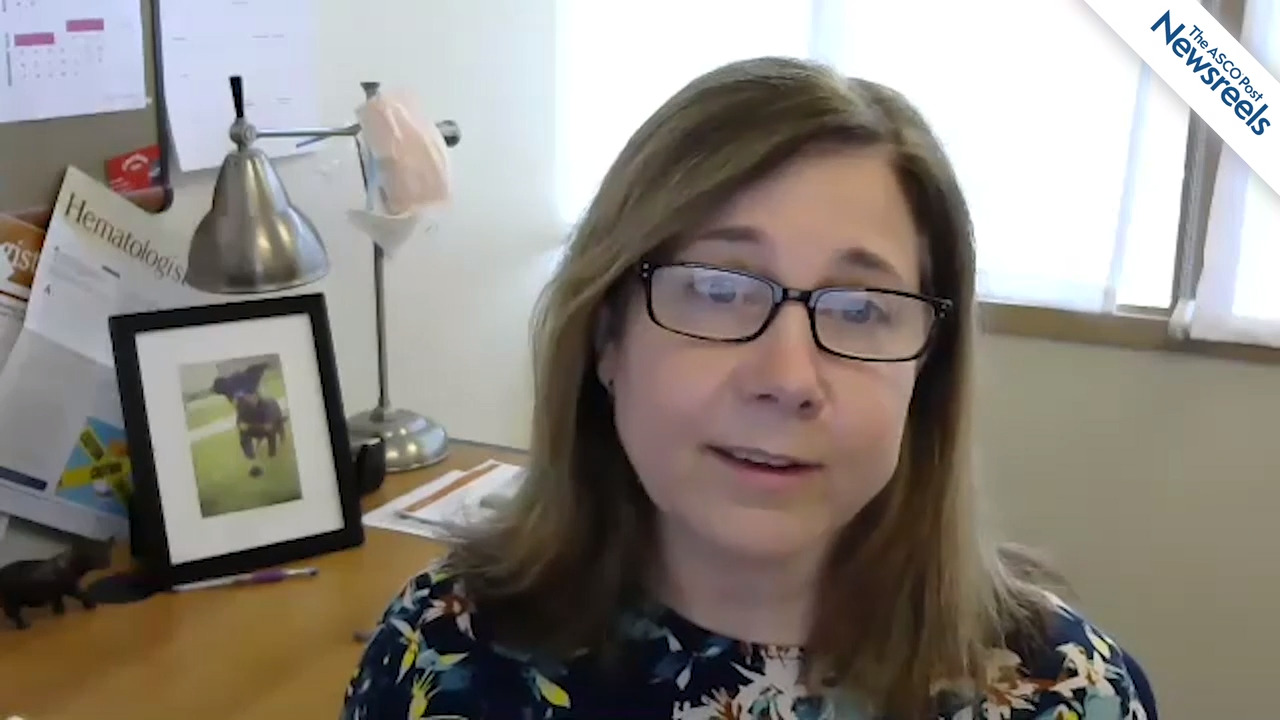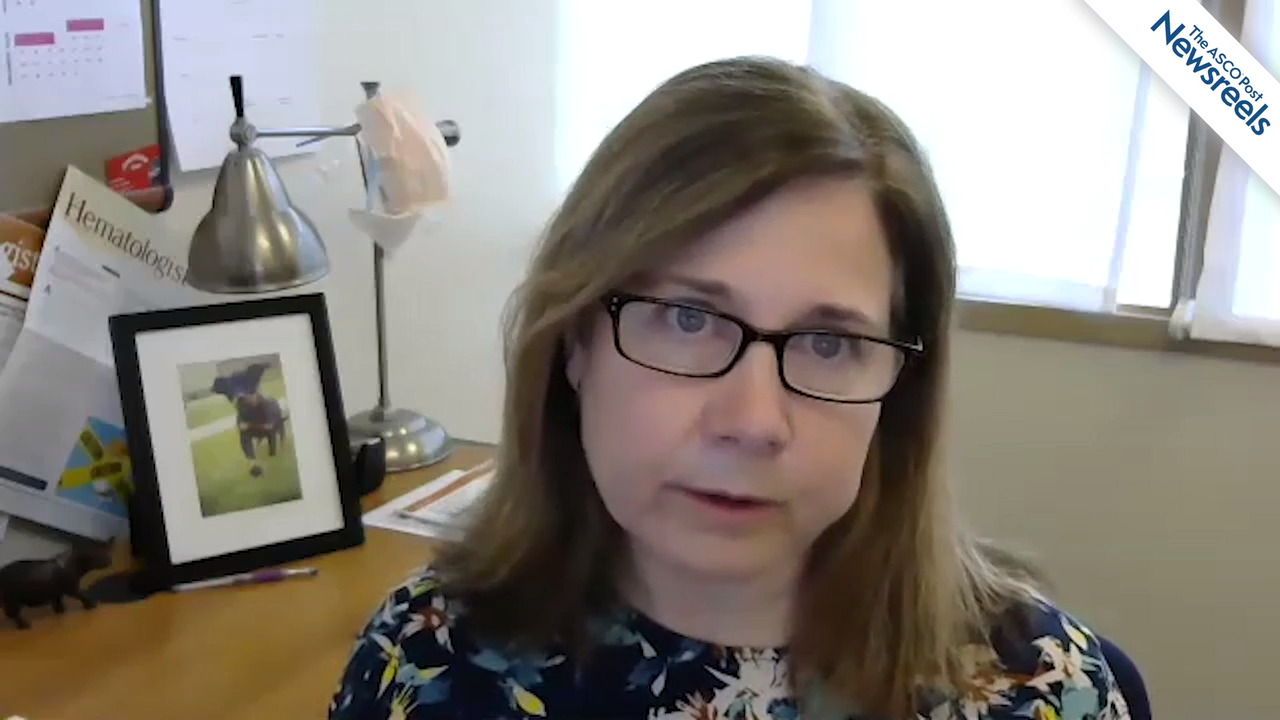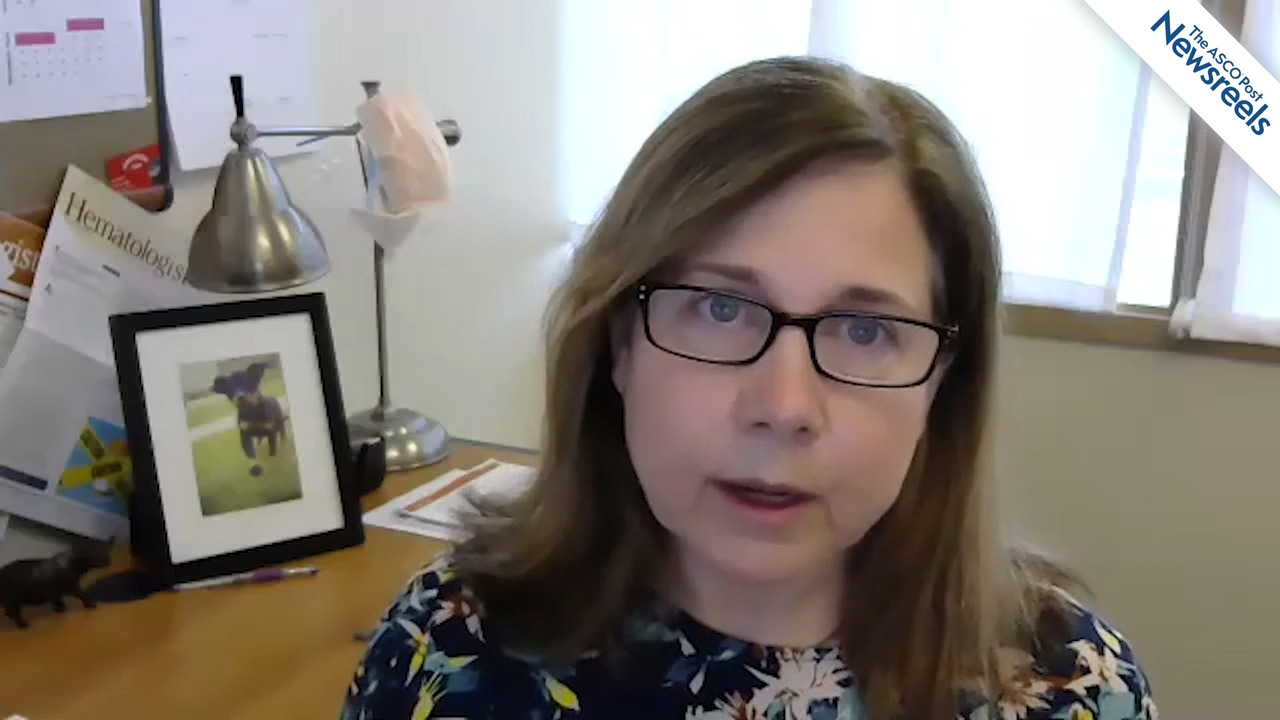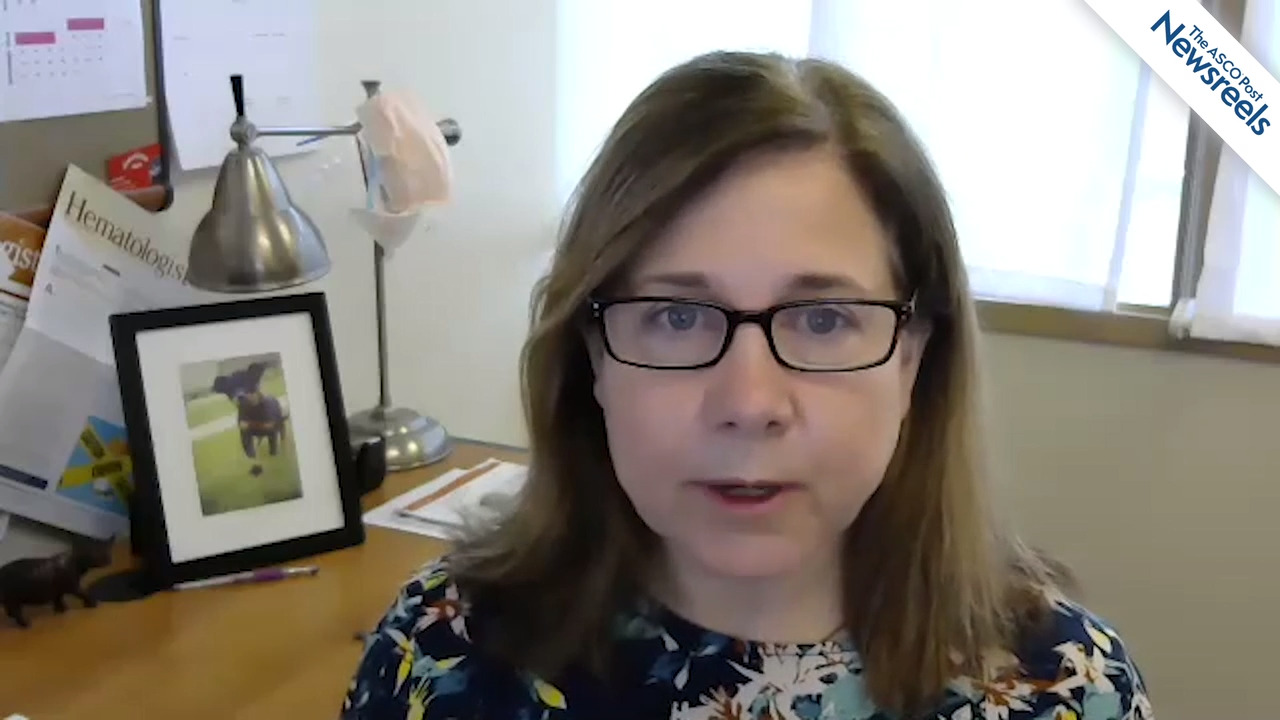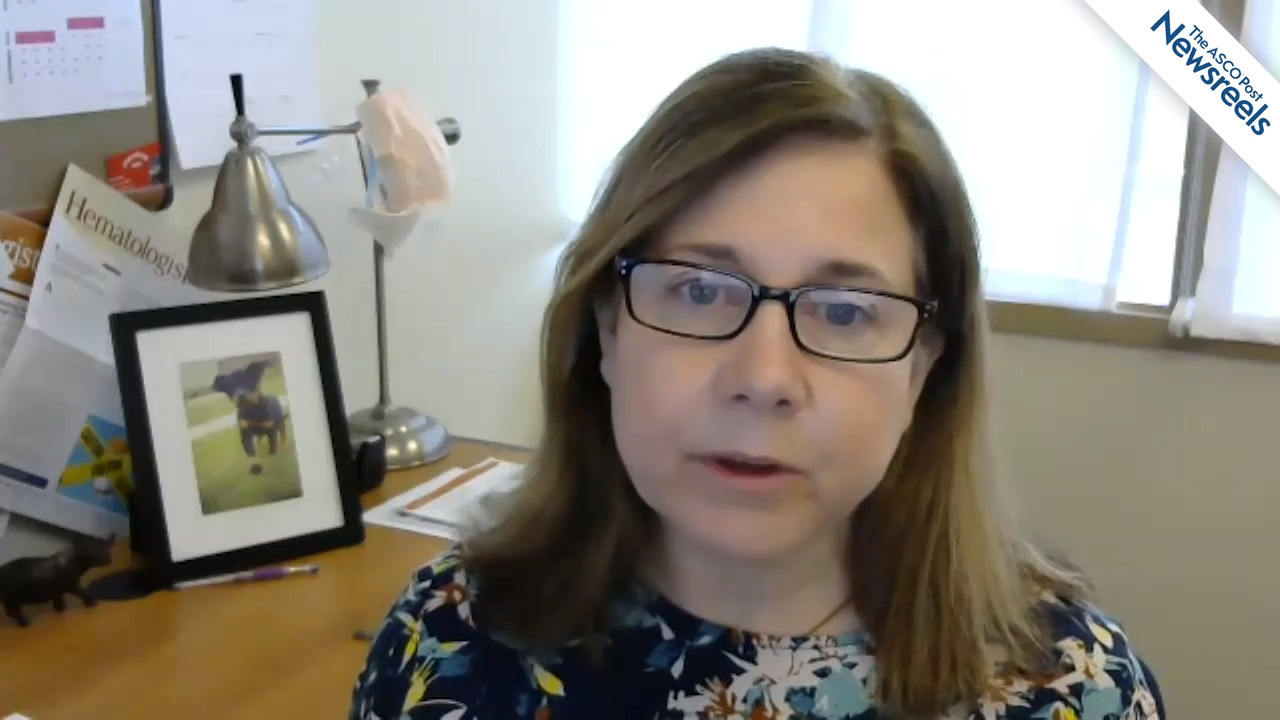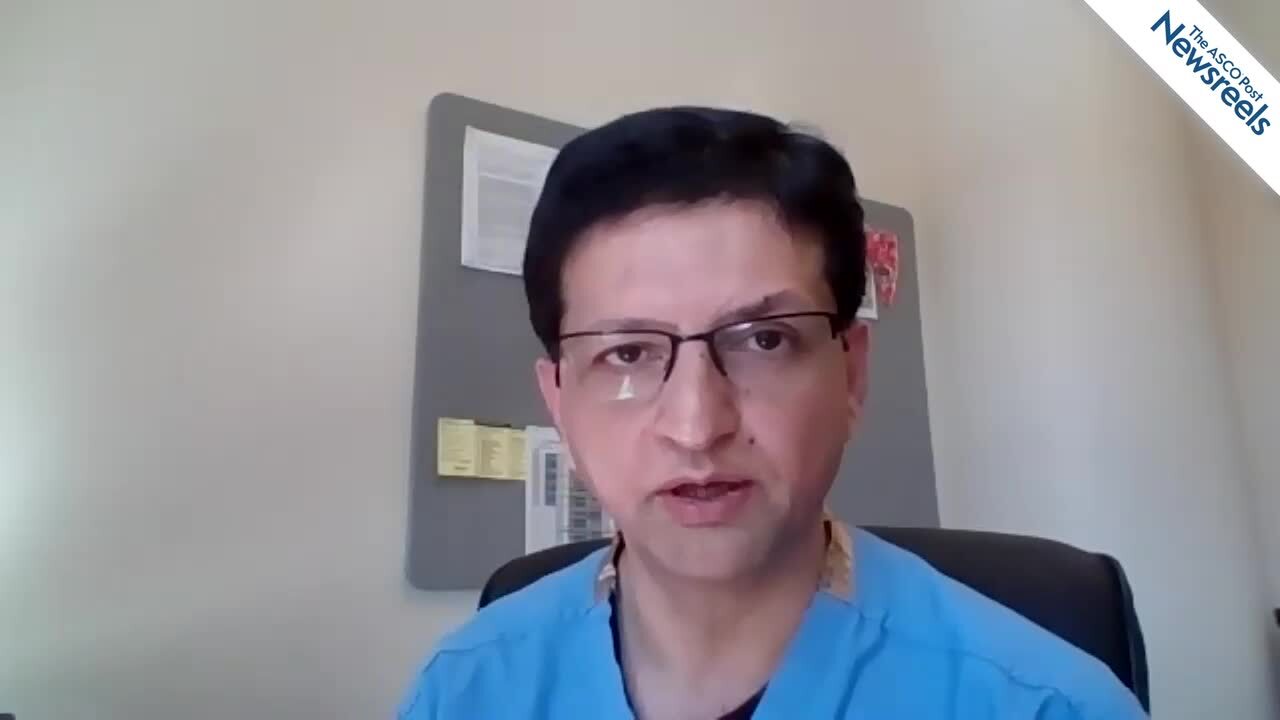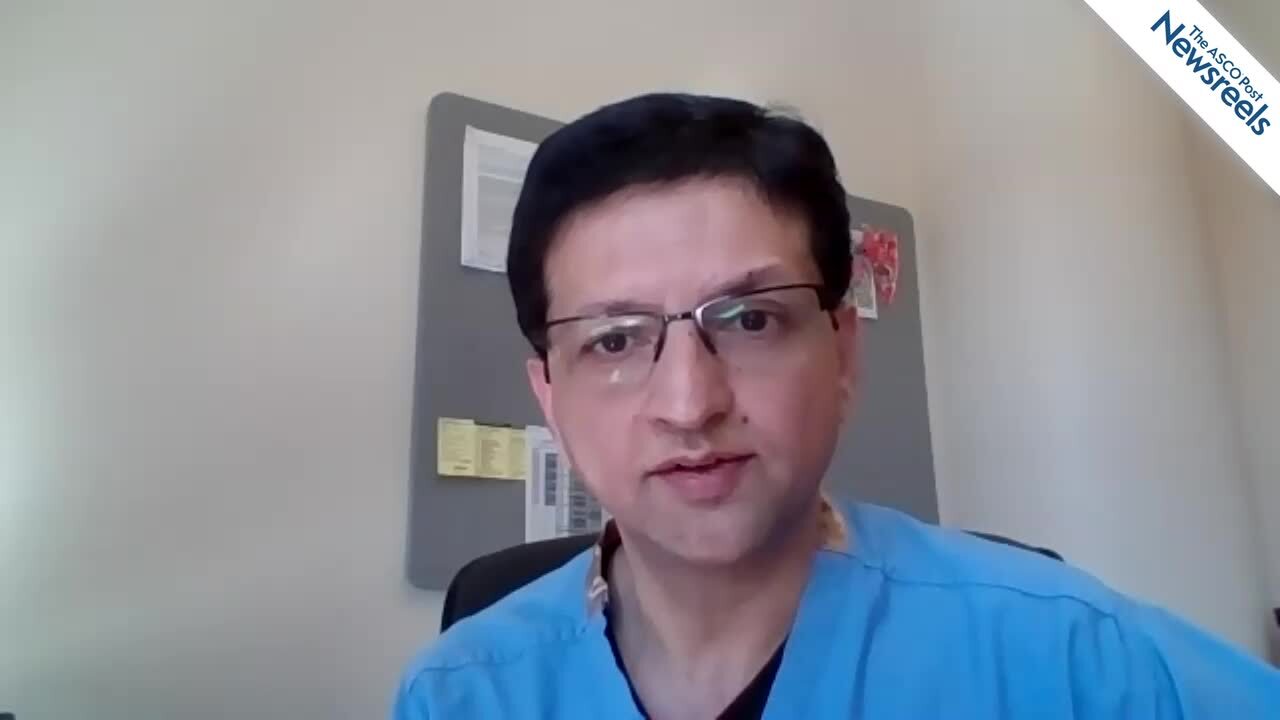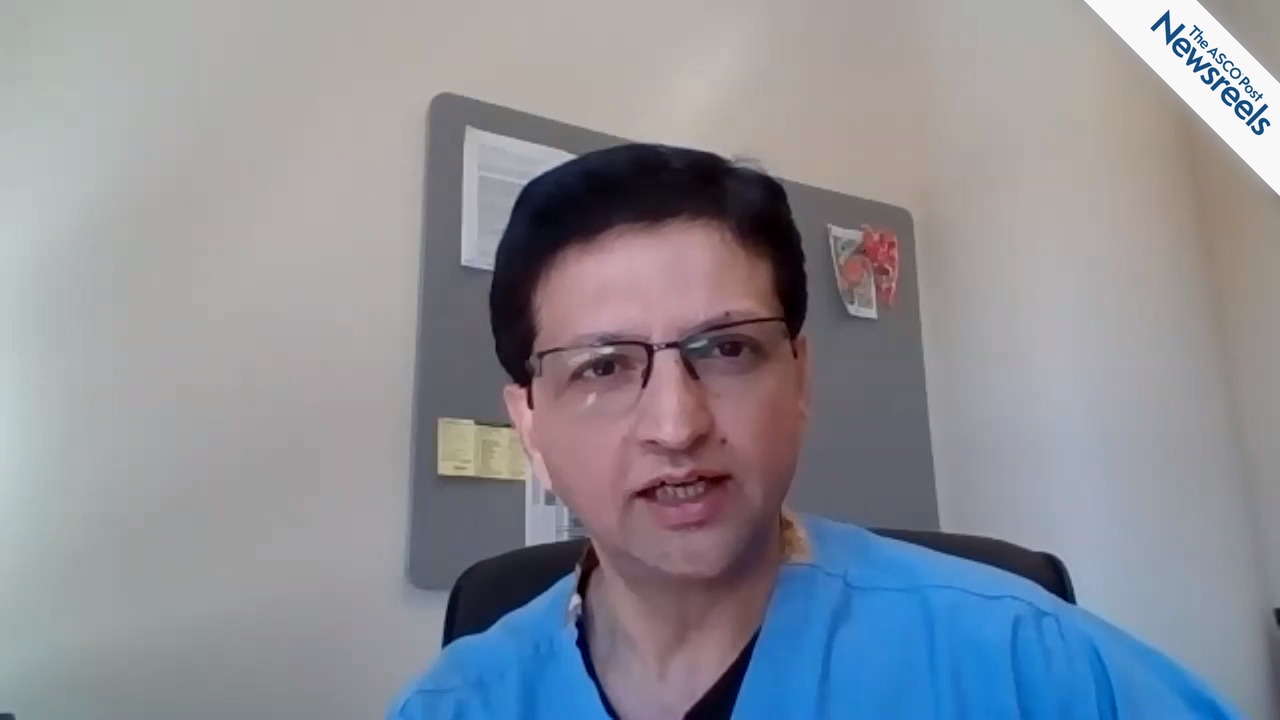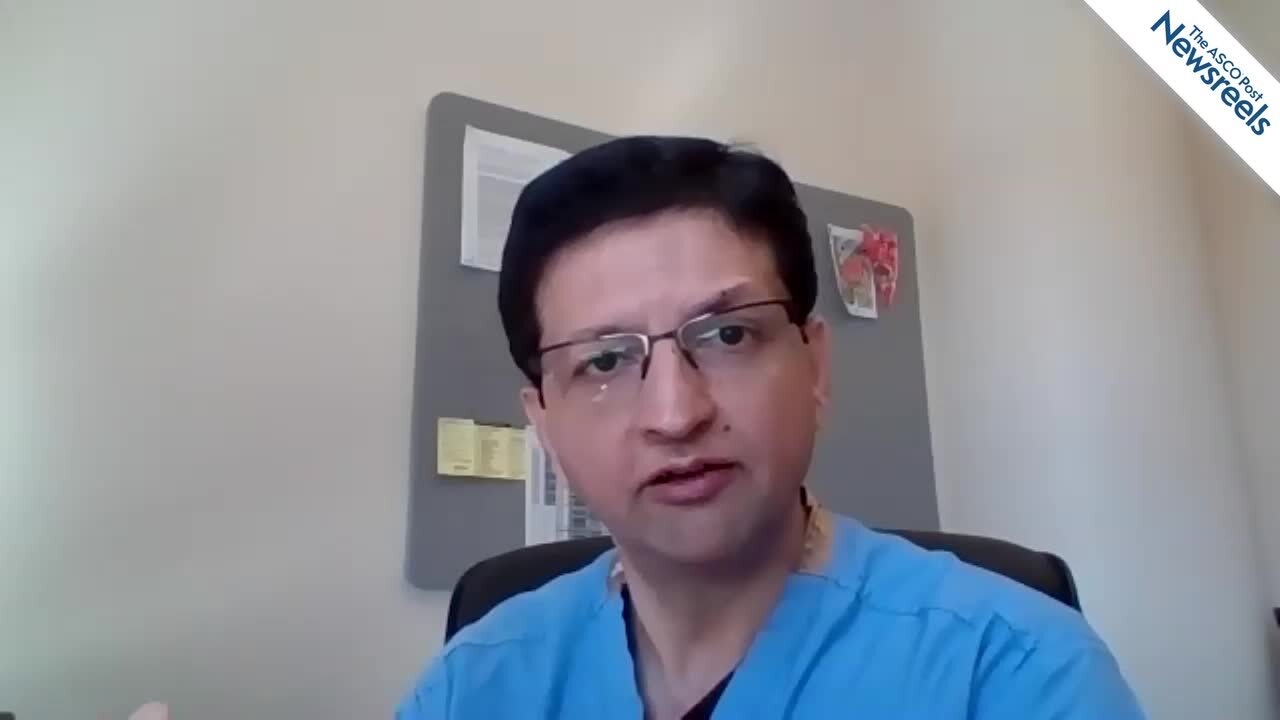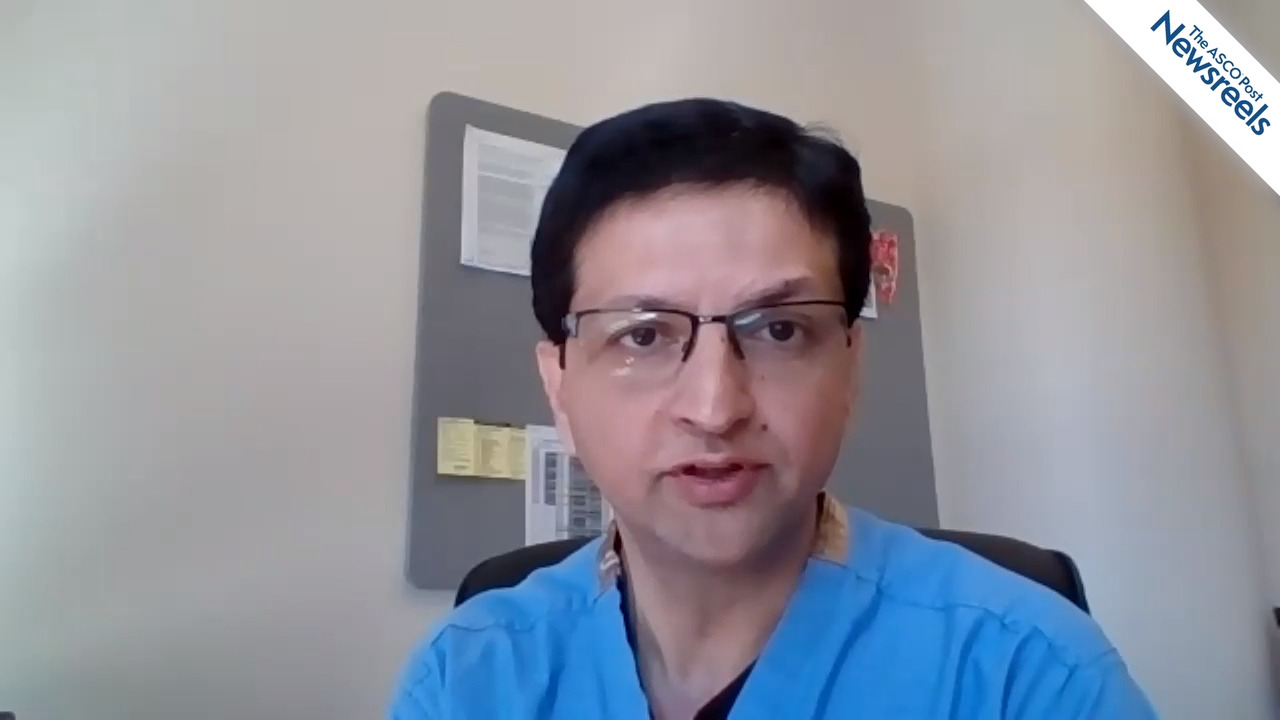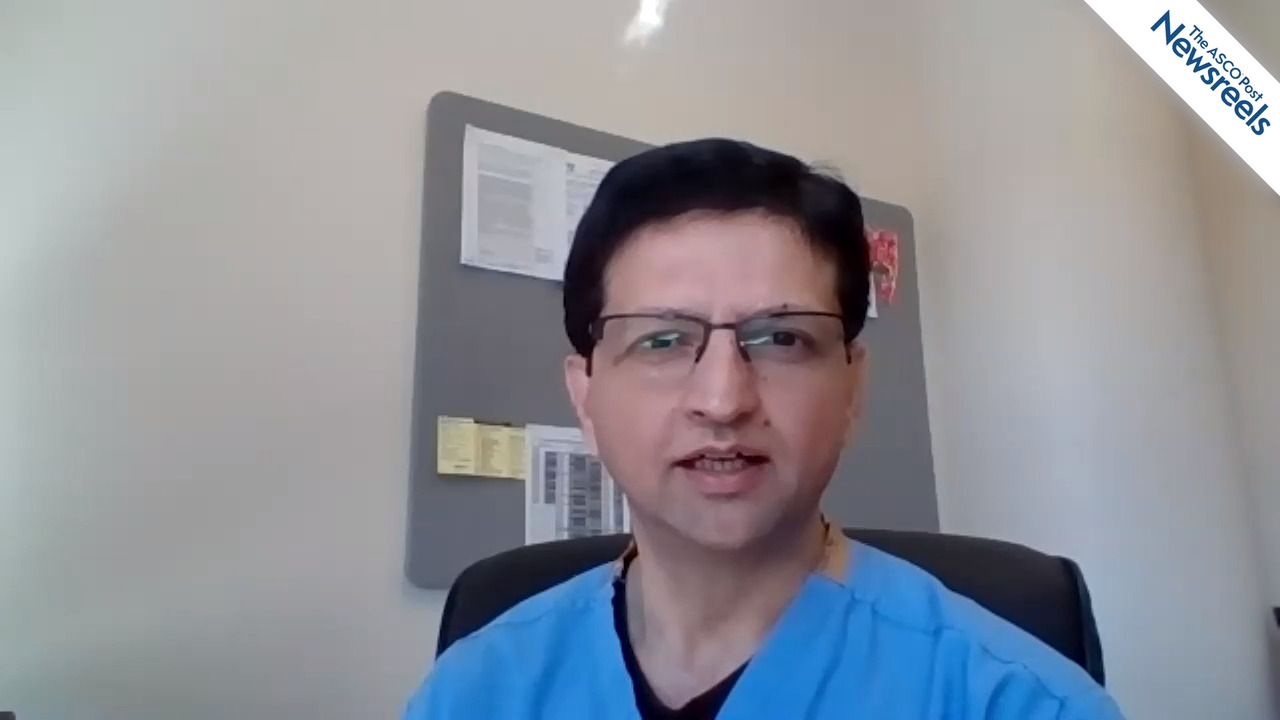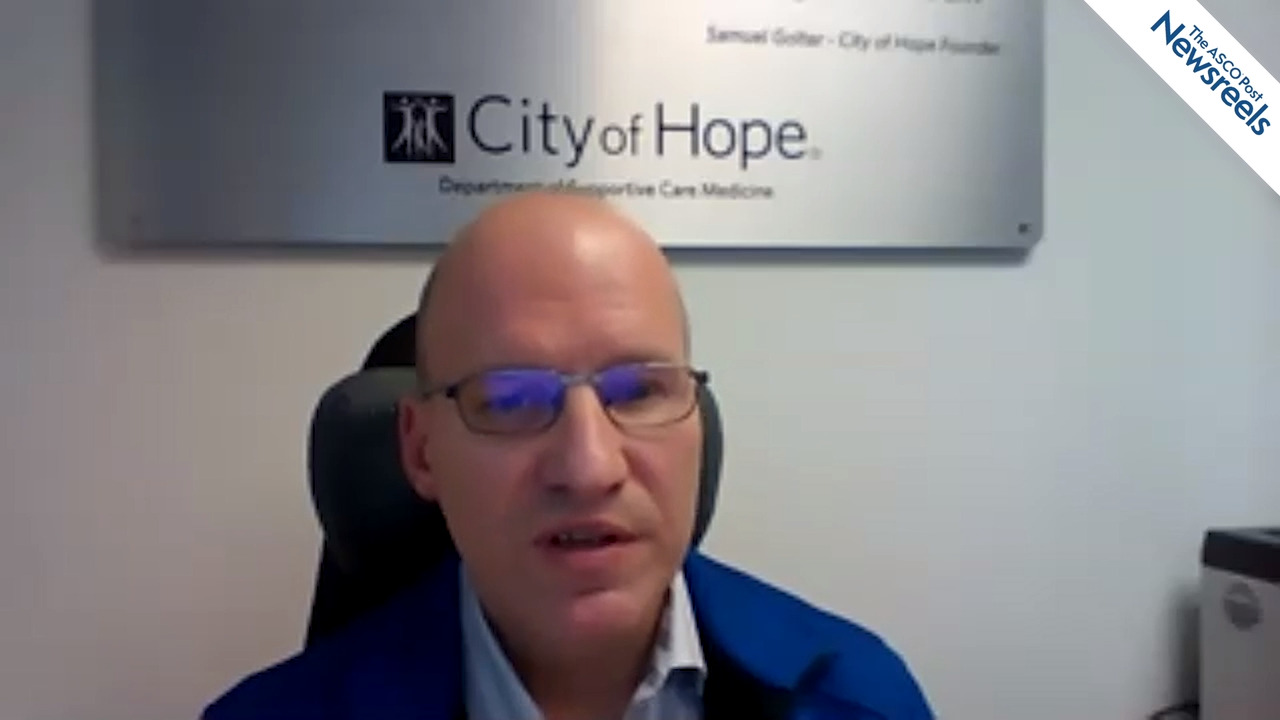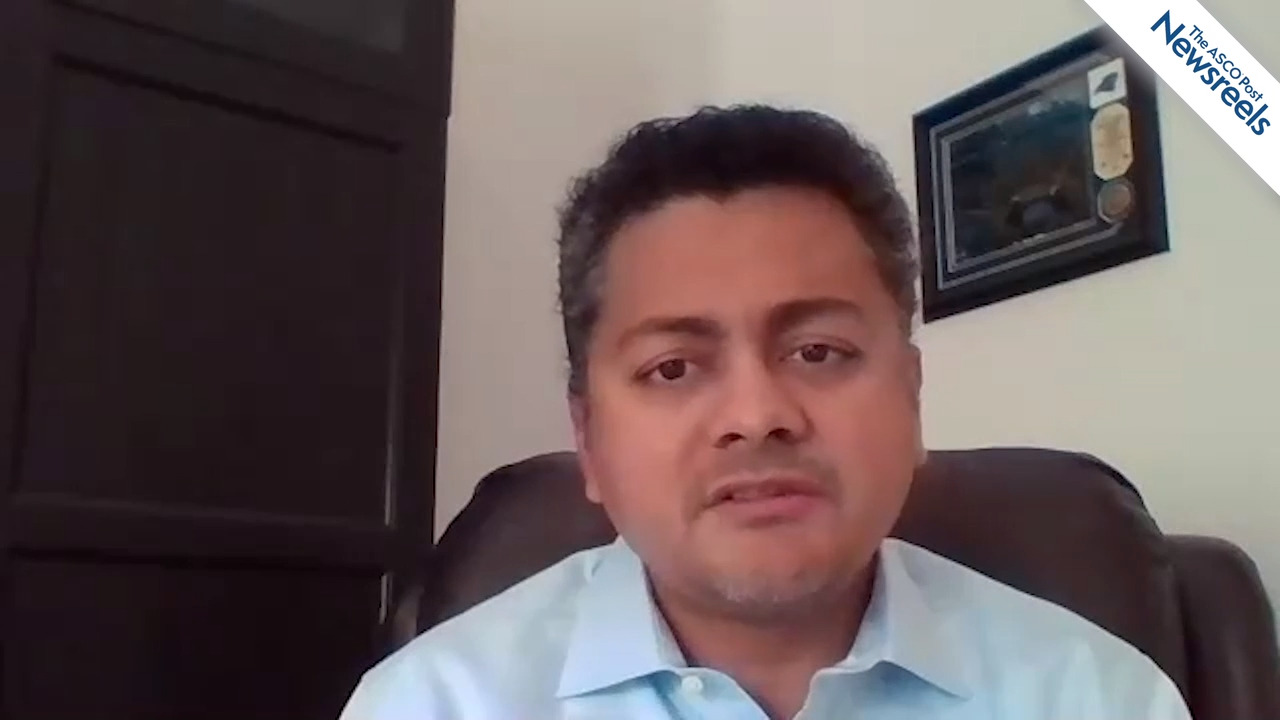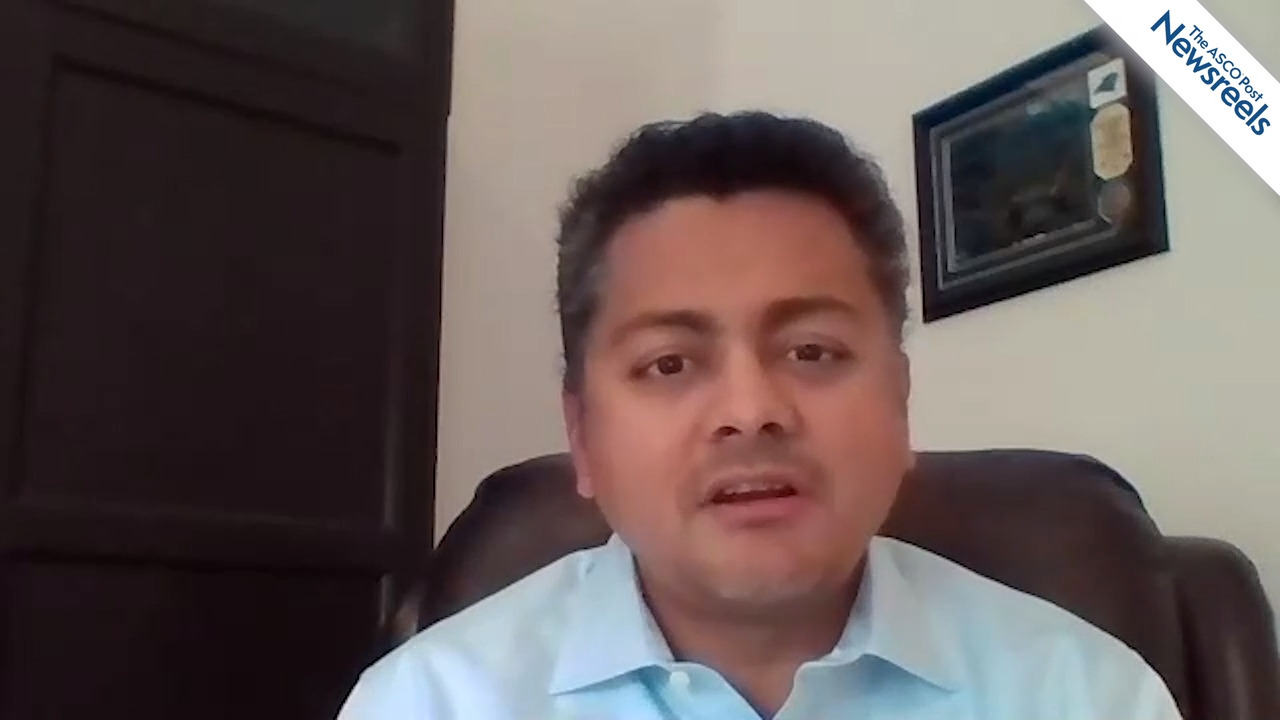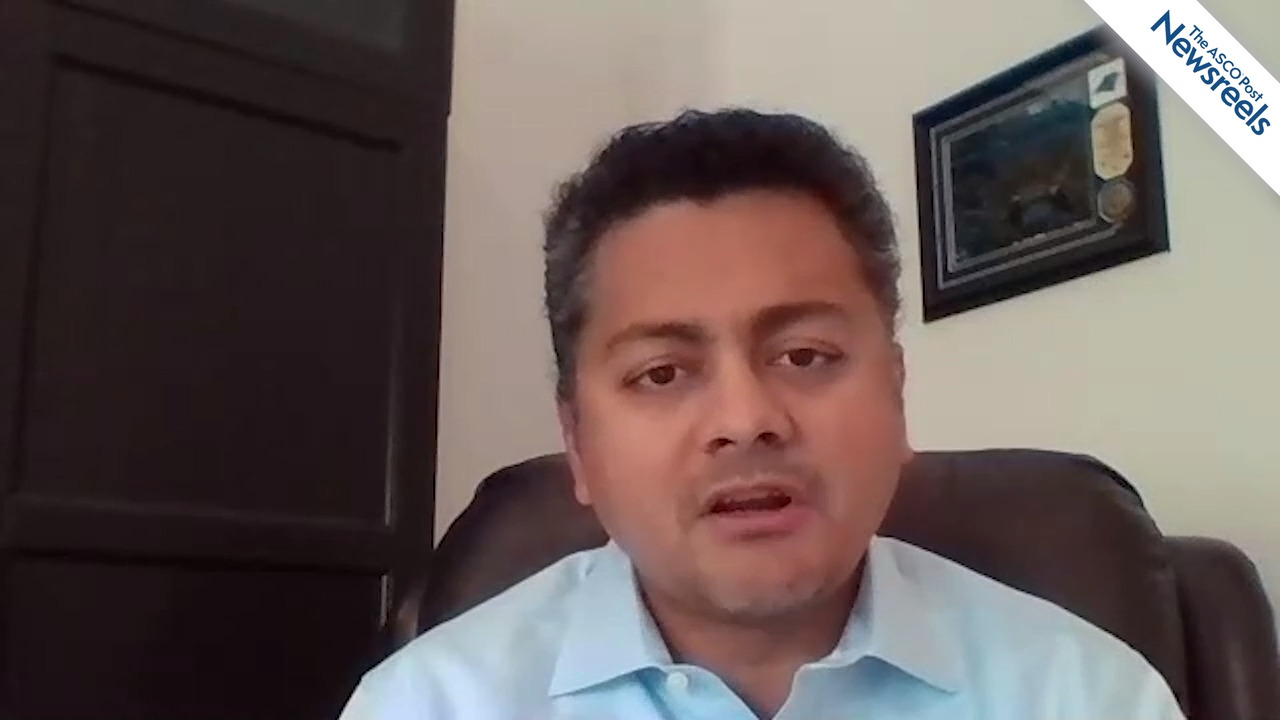Jennifer A. Woyach, MD, on New Findings on CLL, COVID-19, and Treatment With Obinutuzumab Plus Venetoclax
Jennifer A. Woyach, MD, of The Ohio State University Comprehensive Cancer Center, discusses results of a phase III study showing that progression-free survival with ibrutinib plus obinutuzumab plus venetoclax is not superior to ibrutinib plus obinutuzumab for treatment-naive older patients with chronic lymphocytic leukemia (CLL) in the setting of the COVID-19 pandemic. Long-term follow-up will determine whether there are advantages to obinutuzumab plus venetoclax, with special attention to measurable residual disease and therapy discontinuation (Abstract 7500).
Jenny S. Guadamuz, PhD, on Racial and Socioeconomic Disparities in Telemedicine Use Among U.S. Patients With Cancer During the COVID-19 Pandemic
Jenny S. Guadamuz, PhD, of Flatiron Health, discusses the use of telemedicine services in community oncology clinics for patients initiating treatments for 21 common cancers during the COVID-19 pandemic. Black, uninsured, non-urban, and less affluent patients were less likely to use telemedicine services. Although telemedicine may expand access to specialty care, the proliferation of these services may widen cancer care disparities if equitable access to these services is not ensured, according to Dr. Guadamuz (Abstract 6511).
Maria Elena Martinez, PhD, MPH, on Colorectal Cancer Screening in Underserved Populations: COVID, Silver Linings, and Challenges Ahead
Maria Elena Martinez, PhD, MPH, of the University of California, San Diego Moores Cancer Center, provides an overview of the key components of the Accelerating Colorectal Cancer Screening and Follow-up through Implementation Science program, challenges posed by the COVID-19 pandemic, and opportunities for overcoming these challenges. Although screening and follow-up may reduce the incidence of and mortality from colorectal cancer, these disparities persist in medically underserved populations (Abstract SY30).
Sumanta K. Pal, MD, on Advances in Genitourinary Cancer Treatment: Expert Perspective
Sumanta K. Pal, MD, of City of Hope National Medical Center, discusses some key research developments in kidney cancer, including data on nivolumab and ipilimumab with or without CBM588 in metastatic renal cell carcinoma; intestinal microbiome associated with the development of grade 3 or 4 adverse events in patients with metastatic disease who have been treated with nivolumab plus ipilimumab and probiotic support; the link between TERT promoter mutations and clinical outcome with immune checkpoint inhibitor therapy for advanced urothelial cancer; mutations in the androgen receptor gene in patients with prostate cancer receiving novel androgen deprivation treatments; and findings on waning antibody titers in patients who have received COVID-19 vaccinations (Roundup of Abstracts 371, 561, 374, Posters 38 and 48).
Nikhil C. Munshi, MD, PhD, on COVID-19 Vaccine Effectiveness in Patients With Multiple Myeloma
Nikhil C. Munshi, MD, PhD, of Dana-Farber Cancer Institute, discusses the findings from a large nationwide Veterans Affairs study, which showed that, for patients with multiple myeloma, the effectiveness of the COVID-19 vaccine is reduced, likely due to patients’ immunosuppression. Dr. Munshi describes what next steps should be taken (Abstract 400).
Jeffrey Weber, MD, PhD, on Coronavirus, Cancer, and Immunotherapy: Navigating Clinical Trials and Treatment
Jeffrey Weber, MD, PhD, of NYU Langone Medical Center, offers his perspective on the impact of the COVID-19 pandemic on oncology care and cancer clinical trials, as clinicians strive to provide optimal treatment to patients while reducing their risk of contracting the coronavirus. The steep decline in trial enrollment has recovered, with many of the changes in how research was conducted as a result of the pandemic still in place and improving the process going forward.
Hannah E. Dzimitrowicz, MD, on COVID-19 Vaccination in Patients With Cancer Receiving Immune Checkpoint Inhibitors
Hannah E. Dzimitrowicz, MD, of Duke Cancer Center, discusses study results showing that in patients with melanoma and renal cell cancer receiving immune checkpoint inhibitor therapy, the COVID-19 vaccination appears to be well tolerated and safe. A higher rate of post-vaccination symptoms reported in these patients is likely related to more frequent visits compared with controls (Abstract 625).
Jonathan Lim, MBBS, MRCP: The Future of the Oncology Workforce Since the COVID-19 Pandemic
Jonathan Lim, MBBS, MRCP, of Christie NHS Foundation Trust and the Francis Crick Institute, discusses results of an ESMO survey, which showed that the risk of poor well-being, distress, and burnout has continued to rise since the onset of the COVID-19 pandemic, despite improved job performance and sustained resilience. Those most at risk, he says, are women aged 40 years and younger (Abstract 561O).
Matthew Smeltzer, PhD, on International Lung Cancer Clinical Trials: The Impact of COVID-19
Matthew Smeltzer, PhD, of the University of Memphis, discusses a study of 171 trials in 45 countries that saw reduced enrollment as a result of the COVID-19 pandemic. Among the recommended steps to remove barriers and improve participation are more flexibility in allowing telehealth visits with researchers as well as clinicians, local lab testing and scans, altering trial schedules, and mailing experimental agents to patients whenever possible (Abstract PL02.09).
Paul G. Richardson, MD, on Multiple Myeloma and COVID-19: An Update
Paul G. Richardson, MD, of Dana-Farber Cancer Institute, discusses challenges patients with multiple myeloma have faced as a result of the COVID-19 pandemic and the research he and his international colleagues are conducting to better understand these difficulties and improve patient care.
Thomas K. Varghese, Jr, MD, on the Effects of the COVID-19 Pandemic on Cancer Care
Thomas K. Varghese, Jr, MD, of Huntsman Cancer Institute at the University of Utah, summarizes a panel discussion on how the COVID-19 pandemic has interrupted cancer screenings, when telemedicine works and when it doesn’t, opening alternative care sites in the community, and the emotional and mental toll the coronavirus has taken on health-care providers.
Brian M. Slomovitz, MD, on the Impact of COVID-19 on Gynecologic Cancer Research
Brian M. Slomovitz, MD, of Florida International University, describes how emphasizing diversity and shifting away from clinical trials at universities helped The GOG Foundation, Inc., increase patient accrual by 50% in 2020 (ID # 10215).
Fred R. Hirsch, MD, PhD, on Searching for Therapeutic Strategies for Patients With Lung Cancer and COVID-19 Infection
Fred R. Hirsch, MD, PhD, of Mount Sinai Medical Center, invites his colleagues to enroll their patients in a large prospective study, for which he serves as Principal Investigator. The study is searching for solutions for treating patients with lung cancer who also have the coronavirus, because so many experience an aggressive course of infection.
David Fajgenbaum, MD, MBA, on Repurposing Cancer Drugs to Treat COVID-19
David Fajgenbaum, MD, MBA, of the University of Pennsylvania, talks about his research efforts to find an already-approved drug that could treat his orphan disease—multicentric Castleman disease—and how that methodology may be applied to the coronavirus and the cytokine storm it can cause (Symposium 5).
Giuseppe Curigliano, MD, PhD: In the Face of COVID, Continuity in Cancer Care
Giuseppe Curigliano, MD, PhD, of the University of Milan and Istituto Europeo Oncologico, talks about designing public health measures focused on COVID-19 morbidity and mortality for cancer patients, defining treatment and vaccine priorities, and creating a model to assess the impact of control measures (Symposium 6).
Antoni Ribas, MD, PhD, on Highlights of AACR’s COVID-19 and Cancer Meeting
Antoni Ribas, MD, PhD, of the University of California, Los Angeles and Jonsson Comprehensive Cancer Center, and President of the American Association for Cancer Research, talks about why the meeting was held, how the coronavirus has affected cancer care and will impact long-term survivorship, as well as health-care disparities and changes to clinical trials.
Toni K. Choueiri, MD, on the Effects of Cancer Treatments on Patients Infected With COVID-19
Toni K. Choueiri, MD, of Dana-Farber Cancer Institute, discusses the challenges of delivering optimal cancer treatments in the face of the coronavirus pandemic. Focusing on systemic therapies, he reviews prognostic factors in people with cancer and COVID-19 (Symposium 9).
Dafna Bar-Sagi, PhD, on COVID-19: How Cancer Researchers Can Help Address the Challenges
Dafna Bar-Sagi, PhD, of New York University Langone Medical Center, summarizes a panel discussion she moderated on skills the cancer research community brings to bear on the coronavirus pandemic, how the influx of funding will affect future priorities, and ways to capitalize on the surge of interdisciplinary efforts to address medical issues. The panel was composed of: Ann D. Barker, Chief Strategy Officer at the Ellison Institute of University of Southern California. Previously, Ann served as the Principal Deputy Director of the National Cancer Institute for strategic scientific initiatives. Tyler Jacks, Director of Koch Institute for Integrative Cancer Research at MIT. Tom Lynch, President and Director of Fred Hutchinson Cancer Research Center. Shiva Malek, Senior Director and Principal Scientist of Discovery Oncology at Genentech. J.T. Poirier, a junior faculty from the Perlmutter Cancer Center at NYU Langone Health.
Cardinale B. Smith, MD, PhD, on Telehealth Disparities During the COVID-19 Pandemic
Cardinale B. Smith, MD, PhD, of the Icahn School of Medicine at Mount Sinai, discusses findings showing Black, Hispanic, and Asian patients with cancer used telehealth less often during the COVID-19 pandemic than White patients with cancer, a negative trend that will become more problematic as this method of care continues to increase through subsequent waves of coronavirus infection and plays a larger role in standard treatment (Abstract 87).
Melissa K. Accordino, MD, on Breast Cancer Care Delivery: Impact of the COVID-19 Pandemic
Melissa K. Accordino, MD, of Columbia University Medical Center, discusses findings showing nearly half of the patients with breast cancer treated at an academic center in New York City experienced a change or delay in their workup or treatment during the COVID-19 pandemic. Race and socioeconomic factors played a significant role (Abstract 88).
Marina C. Garassino, MD, on COVID-19 and Thoracic Malignancies: TERAVOLT Registry
Marina C. Garassino, MD, of the Istituto Nazionale dei Tumori di Milano, discusses the global registry she and her colleagues created to track and address the 35% higher mortality risk from COVID-19 among patients with lung cancer who are treated with chemotherapy.
Gabriella Pravettoni, PhD, on COVID-19 and Cancer: Psychological Effects on Patients and Oncologists
Gabriella Pravettoni, PhD, of the University of Milan, discusses the need for tailored psychological interventions to take care of oncologists, health-care workers, and patients with cancer affected by the coronavirus crisis. The interventions can help minimize burnout and post-traumatic stress disorder.
Robert A. Winn, MD, on the Impact of COVID-19 on Cancer Care Among Racial and Ethnic Minorities
Robert A. Winn, MD, of Virginia Commonwealth University and the Massey Cancer Center, discusses the COVID-19 pandemic and how it is exacerbating disparities in cancer care among racial and ethnic minorities and the medically underserved who are disproportionately affected by the coronavirus (Session VSS06).
Jessica Y. Islam, PhD, MPH, on COVID-19 Preventive Behaviors Among Cancer Survivors
Jessica Y. Islam, PhD, MPH, of the UNC Lineberger Comprehensive Cancer Center, discusses findings from the COVID-19 Impact Survey, which showed that cancer survivors are adhering to many of the recommended COVID-19 preventive behaviors, such as wearing masks and social distancing.
Nancy E. Davidson, MD, on Bringing Patients With Cancer Back to the Clinic During the COVID-19 Pandemic
Nancy E. Davidson, MD, of Fred Hutchinson Cancer Research Center, talks about a panel she moderated in which speakers discussed the importance of communicating with patients to ease their concerns about cancer care during the COVID-19 pandemic, allocating protective gear for the most vulnerable patients, increasing telehealth visits, ensuring rapid access to COVID-19 testing, and altering office space to allow for social distancing (Forum 3).
Antoni Ribas, MD, PhD, on AACR Virtual Meeting: COVID-19 and Cancer Highlights
Antoni Ribas, MD, PhD, of the University of California, Los Angeles, Jonsson Comprehensive Cancer Center, and the President of AACR, discusses this special conference that focused on emerging data related to COVID-19 and cancer, ways in which the coronavirus pandemic has altered treatment of patients with cancer, and the impact on cancer outcomes and psychosocial disorders.
Catherine H. Marshall, MD, MPH, on Promoting Recovery From COVID-19 Infection With Endocrine Therapy
Catherine H. Marshall, MD, MPH, of Johns Hopkins Hospital, discusses phase II trial results on bicalutamide, an oral antiandrogen used to treat prostate cancer. Bicalutamide may be helpful in downregulating the TMPRSS2 and ACE proteins needed for the SARS-CoV-2 virus; upregulating estradiol to help resolve acute lung injury; and improving outcomes in patients with COVID-19 infection (Symposium 4).
Karen E. Knudsen, MBA, PhD, on the Challenges of Using Telehealth in Cancer Care
Karen E. Knudsen, MBA, PhD, of the Sidney Kimmel Cancer Center at Jefferson Health, summarizes a panel she moderated on telehealth, which included discussion of usage in urban vs rural populations, preventing the technology from becoming a new source of disparities in cancer care, and uncertainties about reimbursement policies.
Arthur L. Caplan, PhD, on Ethics, Cancer, and COVID-19
Arthur L. Caplan, PhD, of New York University–Langone Health, discusses the areas in cancer care that need to be improved in the midst of the coronavirus pandemic, including a better definition of essential medical services based on the potential to save lives, offer good quality of life, and ease patients’ concerns about coming for treatment (Symposium 7).
Miguel-Angel Perales, MD, and Syed A. Abutalib, MD, on Bone Marrow Transplants During the COVID-19 Pandemic
Syed A. Abutalib, MD, of Cancer Treatment Centers of America, talks with Miguel-Angel Perales, MD, of Memorial Sloan Kettering Cancer Center, about the challenges and concerns related to transplants for patients with hematologic malignancies who are particularly vulnerable to infection with the coronavirus. Recorded July 13, 2020.
Jeremy L. Warner, MD, on the Clinical Impact of COVID-19 on Patients With Cancer
Jeremy L. Warner, MD, of Vanderbilt-Ingram Cancer Center, discusses data from the COVID-19 and Cancer Consortium cohort study, which included patients with active or prior hematologic or invasive solid malignancies, reported across academic and community sites (Abstract LBA110).
Leora Horn, MD, on Thoracic Cancer and COVID-19: How Type of Cancer Therapy May Affect Survival
Leora Horn, MD, of Vanderbilt University, discusses the results of the TERAVOLT study, launched by the Thoracic Cancers International COVID-19 Collaboration. It examined the impact of specific chemotherapy and immunotherapy regimens on hospitalization and risk of death in patients with thoracic malignancies who are also infected with COVID-19 (Abstract LBA111).
Merry-Jennifer Markham, MD: Perspectives on Three Abstracts From the ASCO Cancer Communications Chair
Merry-Jennifer Markham, MD, ASCO’s Cancer Communications Chair, gives her views on key papers presented at the ASCO20 Virtual Scientific Program, addressing gynecologic malignancies and COVID-19.
Mikkael A. Sekeres, MD, on Cancer Treatment in the Age of COVID-19: Personal Observations
Mikkael A. Sekeres, MD, of the Cleveland Clinic, talks about the ways in which social distancing and viral fears have affected the way he delivers treatment for his patients, as well as the effect on their psyches—and his. Recorded April 10, 2020.
Mikkael A. Sekeres, MD, on Cancer Treatment in the Age of COVID-19: Personal Observations
Mikkael A. Sekeres, MD, of the Cleveland Clinic, talks about the ways in which social distancing and viral fears have affected the way he delivers treatment for his patients, as well as the effect on their psyches—and his. Recorded April 10, 2020.
Laura C. Michaelis, MD: In My Experience Question 5
For community oncologists treating patients with chronic myeloid leukemia or chronic lymphocytic leukemia during the COVID-19 pandemic, what resources and clinical pearls would you suggest? Recorded April 24, 2020.
Laura C. Michaelis, MD: In My Experience Question 4
At this time, would you consider pausing therapy—specifically signaling inhibitors and/or monoclonal antibodies—in patients with chronic lymphocytic leukemia? Recorded April 24, 2020.
Laura C. Michaelis, MD: In My Experience Question 2
Are you treating patients with advanced chronic myeloid leukemia (accelerated phase or blast crisis) any differently during the COVID-19 pandemic? Recorded April 24, 2020.
Laura C. Michaelis, MD: In My Experience Question 1
How has the COVID-19 pandemic changed your approach to the selection of tyrosine kinase inhibitors for the treatment of patients with chronic myeloid leukemia? Recorded April 24, 2020.
Mehdi Hamadani, MD: In My Experience Question 6
Are you proceeding with front-line autologous transplant in patients with mantle cell lymphoma or delaying it during the COVID-19 pandemic? Recorded April 21, 2020.
Mehdi Hamadani, MD: In My Experience Question 5
For community oncologists treating patients with non-Hodgkin lymphoma during the COVID-19 pandemic, what resources and clinical pearls would you suggest? Recorded April 21, 2020.
Mehdi Hamadani, MD: In My Experience Question 4
How have the activities of the Center for International Blood and Marrow Transplant Research been affected by the COVID-19 pandemic? Recorded April 21, 2020.
Mehdi Hamadani, MD: In My Experience Question 3
During the COVID-19 pandemic, would you still recommend immediate upfront autologous transplant in patients with T-cell non-Hodgkin lymphoma? Recorded April 21, 2020.
Mehdi Hamadani, MD: In My Experience Question 2
During the COVID-19 pandemic, when and why would you consider delaying autologous transplant for patients with diffuse large B-cell lymphoma in second complete remission? Recorded April 21, 2020.
Mehdi Hamadani, MD: In My Experience Question 1
Are you testing for COVID-19 before administering therapy on an outpatient basis for patients with non-Hodgkin lymphoma? Recorded April 21, 2020.
William Dale, MD, PhD, on Best Practices for Special Populations During the COVID-19 Pandemic
William Dale, MD, PhD, of City of Hope National Medical Center, discusses vulnerable populations—older adults and those with psychosocial or mental health concerns—and reviews best practices for treatment decisions, social distancing, and maintaining emotional health. Recorded April 15, 2020.
Saad Z. Usmani, MD: In My Experience Question 5
For community oncologists treating patients with multiple myeloma during the COVID-19 pandemic, what resources and clinical pearls would you suggest? Recorded April 24, 2020.
Saad Z. Usmani, MD: In My Experience Question 4
For patients with multiple myeloma who are currently on clinical trials, what are the most pressing issues as we fight COVID-19? Recorded April 24, 2020.
Saad Z. Usmani, MD: In My Experience Question 3
Because of the COVID-19 pandemic, has your management strategy changed for post-transplant consolidation and maintenance therapy in patients with multiple myeloma? Recorded April 24, 2020.
